





































































The Growth and Sustainability Loan Scheme supports strategic investments in the growth and resilience of the business or in environmentally friendly technology with long-term low-cost finance up to €3 million.


































































































The Growth and Sustainability Loan Scheme supports strategic investments in the growth and resilience of the business or in environmentally friendly technology with long-term low-cost finance up to €3 million.































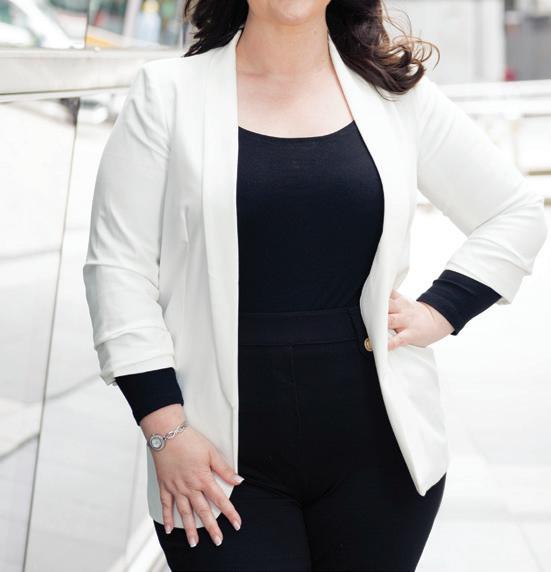




Editor: Denise Maguire
Designer: Alan McArthur





Creative Director: Jane Matthews
Production Executive: Nicole Ennis
Managing Director: Gerry Tynan
Chairman: Diarmaid Lennon
Email: info@ashville.com or write to: Better Business, Ashville Media, Unit 55, Park West Road, Park West Industrial Estate, Dublin 12, D12 X9F9. Tel: (01) 432 2200
All rights reserved. Every care has been taken to ensure that the information contained in this magazine is accurate. The publishers cannot, however, accept responsibility for errors or omissions. Reproduction by any means in whole or in part without the permission of the publisher is prohibited. © Ashville Media Group 2024. All discounts, promotions and competitions contained in this magazine are run independently of Better Business. The promoter/advertiser is responsible for honouring the prize. ISSN 2009-9118 SFA is a trading name of Ibec.
Welcome to Better Business, a magazine dedicated to the small business community.
In this edition of Better Business, the SFA highlights a busy period of engagement with political stakeholders amid a change of Government leadership and elections in June. e SFA published its policy priorities document which called for, among other things, a PRSI rebate to assist small businesses with the transition towards the Living Wage rates.
Furthermore, the SFA is calling for a reduction in Capital Gains Tax rate from 33% to 20% and wants to introduce a National Training Voucher Scheme, which has the potential to boost in-company training and widen participation in upskilling and reskilling employees.
In response, the Government announced a range of measures aimed at assisting small businesses, such as an increase in the employer PRSI threshold and a doubling of ICOB payment introduced for businesses in the retail and experience sectors. is was a step in the right direction, but there’s a lot more to do.
At the end of May, the SFA published its Cost of Business survey which showed that one in three small businesses will run out of liquidity within six months without additional funding. e survey also showed that average business costs increased by over 16%, with 83% of small businesses experiencing rising costs. With 57% of small businesses reporting increased labour costs in the past 12 months, it highlights the need for a PRSI rebate.
In this issue, the HR pages focus on the forthcoming autoenrolment requirements for all businesses, while the health pages deal with issues related to tiredness and burnout. e entrepreneurs section takes a look at tech rms and our sector spotlight shines a light on Ireland’s life sciences sector.
Going forward, the SFA will be making its budget submission to Government which will align with our policy priorities document. Hopefully, the new local councils, the Harris administration and the new European Commission will produce legislation that will bene t small businesses. e SFA will continue to ensure that small businesses are considered by legislators in the months and years to come.
As always, Better Business contains stories that will both inform and inspire. is issue has a particular focus on public policy. Many of the businesses featured in this publication are the heartbeat of communities and the lifeblood of the wider economy.
Better Business is the magazine of the small business community. We welcome your feedback, suggestions and ideas to info@sfa.ie or on Twitter @SFA_Irl.
David Broderick Director, Small Firms Association

Big News for Small Business News, views and profiles from SFA members and small businesses in Ireland
18
Sector Spotlight
Ireland’s life sciences sector is creating an ecosystem that’s ripe for start-ups to thrive
28
Cover Story
Joining the Backing Business Community at Virgin Media Business gives small firms a platform to learn and grow
52 Health
Implementing wellbeing supports helps minimise the risk of employee burnout
10
Interview
James Loughran at Leinster Environmentals on taking stock of success 14
Top Tips
Increase your sales and business success with The Business Works LACE framework
22
Green Investments
The Growth and Sustainability Loan Scheme can benefit a small firm’s bottom line
48 Policy
Exports of agri-food goods into GB are now subject to Border Control Post (BCP) checks
56 Arts and Culture
Traditional bookshops are doing all they can to fend off tough competition from online retailers
24
Mediation
Before engaging in litigation, businesses should look to mediation and independent intervention
50 HR
A mandatory Auto-enrolment Pension Scheme is due to come into force in January 2025
60
Travel
Businesses exporting to the UK need to be mindful of new requirements coming into force


FROM TOP LEFT: James Loughran at Leinster Environmentals is committed to environmental sustainability, page 10 // Sonia Neary at Wellola on how Dublin is becoming a digital health hub, page 18 // Debbie Behan at Virgin Media Business explains why joining the Backing Business Community is a good idea for small firms, page 28 // John O’Shanahan at LeanBPI wants to help small businesses make the most of technology, page 44



In March 2024, Azets Ireland merged with PKF O’Connor, Leddy & Holmes. Catherine McGovern (Tax Partner), who has worked with the SFA, said the merger has doubled the size of Azets’ Irish business to a workforce of 220. In addition, the merger creates a firm of national scale with the depth of expertise to deliver quality, partner-led services to entrepreneurial, owner managed and family owned businesses in Ireland. Azets Ireland is one of the country’s fastest growing professional services firms, providing a range of services including audit, tax, valuations, M&A, restructuring, due diligence, corporate governance, financial service, outsourcing, payroll and fund management. The combined firm will be based at Azets’ new offices at 40 Mespil Road, Dublin 4 with a regional South East presence in Enniscorthy and Waterford.
In April, the SFA published its policy priorities document ahead of the local and European election campaign. The policy document focuses on four key pillars aimed at creating better conditions for businesses to survive and grow. The pillars are – tackling business costs, easing the tax burden, upskilling the workforce and enabling prosperity through better national infrastructure. Among the various recommendations is the introduction of a PRSI rebate to assist small businesses with the transition towards the incoming Living Wage rates.
The SFA wants implementation to be swift as small businesses do not have the luxury of time and resources that larger businesses might have. The PRSI rebate is more pressing for the retail and experience economy as many businesses in these sectors are most impacted by seasonal demands.
Prior to the launch, the SFA was encouraged by the words of the new Taoiseach Simon Harris during his maiden speech to the Fine Gael Ard Fheis, where he stated that his administration will prioritise small businesses before the general election. At the Fianna Fail Ard Fheis, Tánaiste Micheál Martin made a commitment to changes in employers’ PRSI, which will help small businesses cope with rising costs. Furthermore, the new Minister of Enterprise, Trade and Employment, Peter Burke acknowledged the many concerns facing small businesses in a statement to the Seanad. Since last year, the Small Firms Association (SFA) has been calling for additional assistance for small businesses.
Software company FARMEYE is collaborating with the European Space Agency (ESA) on ‘Purlieu’, a project creating tools to quantify regenerative agriculture. Supported by ESA funding, Purlieu sets out to revolutionise the conservation and management of hedgerows, vital elements of Ireland’s agricultural landscape and fundamental to sustainable agriculture practices. FARMEYE’s Purlieu combines ground-based data capture with satellite imagery and advanced modelling techniques to deliver precise insights into hedgerow measurement and composition. Dr Eoghan Finneran, FARMEYE’s Co-Founder and CEO, said: “Purlieu demonstrates our commitment to innovating cutting-edge technology for the greater good, giving valuable metrics to stakeholders while preserving our natural heritage.”


Palletised freight distribution network company Pall-Ex Group has enhanced its operation by opening a network in Ireland. Operating from its Dublin facility, Pall-Ex Ireland already has 16 members and is actively recruiting more quality logistics businesses to join its membership and take advantage of its sector-leading technology and diverse range of pallet dimensions. The official launch of Pall-Ex Ireland took place in May 2024 with a ceremony held in one of its warehouses. The Minister of State at the Department of Transport with special responsibility for International and Road Transport and Logistics, Jack Chambers, spoke at the event and joined the teams in celebrating the launch of Pall-Ex Ireland.





Financial Wellbeanz has launched a new service – Tax Return Pro by Financial Wellbeanz. Tax Return Pro is a comprehensive and userfriendly platform that simplifies the tax return process. Once you register, you have access to a secure digital portal where you can review up to four years of tax history to see what refund you are due. After completing a short online form, the team will review your details and submit your return to Revenue for the years you are due a refund. Once the refund is received, it will be transferred to the customer on the same day. If you’re not due a refund, there is no fee. Firms who join Financial Wellbeanz will benefit from its lowest commission rate of 6.5%.
Financial Wellbeanz has a comprehensive suite of financial services solutions for employees. This includes free advice on mortgages and mortgage protection, a variety of private wealth options, discounts on car and home insurance and numerous financial wellness resources. The company prides itself on its experienced team of advisors, ensuring tailored solutions for every client’s unique financial situation.
For SFA members, it’s free to join Financial Wellbeanz so register your company at https:// employer. nancialwellbeanz.ie/ signup

Clonakilty Distillery has announced the debut of its first Single Pot Still Irish Whiskey, which hit the shelves nationwide in May. The occasion signified a historic milestone as the hometown-distillery unveiled its first maiden distillate crafted from barley grown on the family farm next to the Atlantic Ocean. The first cask was filled back on May 1st 2019 and within a year, it had secured the title of the ‘World’s Best Irish New Make’ at the World Whiskies Awards. The distillery was also shortlisted for ‘Best Food & Drink Exporter of the Year’ in the IEA’s 2024 Export Industry Awards.
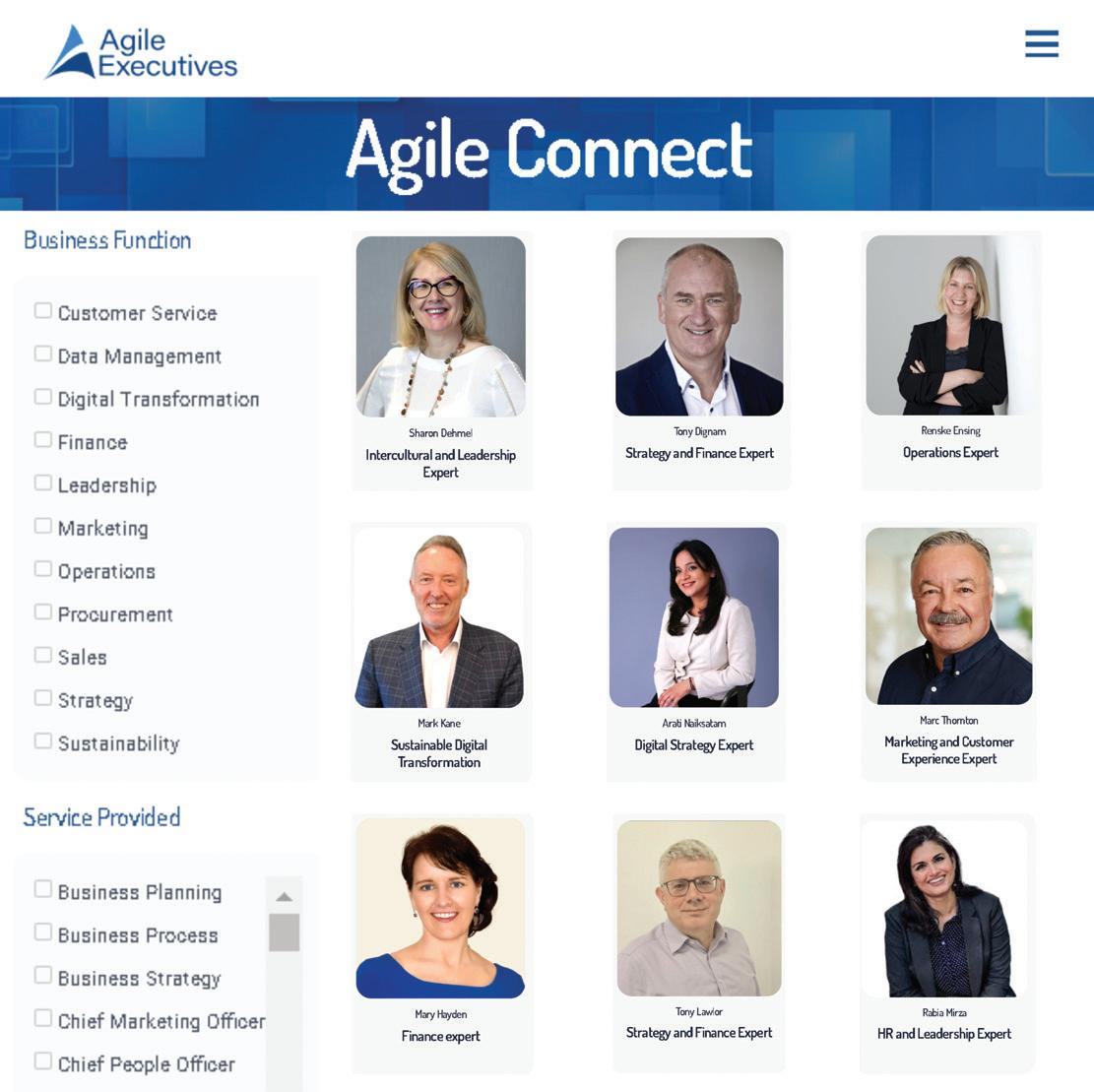
Agile Executives has gone international and added associates from the UK, US, Canada, mainland Europe, Middle East and Asia Pacific to its network which already includes 120 experts in strategy, finance, sales, marketing, digital, automation, HR, operations, data protection, sustainability and procurement. The move provides Irish businesses with a great network to scale into these international markets.

“Small businesses do not have the luxury of time and resources that larger businesses might have.”
David Broderick, Director of
the SFA (in the Irish Examiner)
Unveiled at Whiskey Live 2024, Blackwater Irish Whisky’s ‘The Full Irish’ showcases the three styles of Irish whiskey – grain, single malt and pot still. So far, the West Waterford based distillery has released a single malt, a pot still (highly non-compliant) and a rye – this is their first blend. Blackwater wants to bring some love back to the category, which is sadly neglected in Ireland, so neglected you will even struggle to find the category ‘Blended’ on a bottle. The term is not obligatory as the multinationals are slightly ashamed to look it in the eye. Blackwater is not. The new whiskey contains 45% Blackwater produced single malt, 45% Blackwater produced pot still (both five years old) and 10% seven-year-old grain whiskies, finished in stout casks from local firm, Hopfully Brewing Company.

“Our small businesses are the backbone of our local economy and provide much valued employment in communities across the country.”
Peter Burke
TD,
Minister
for Enterprise, Trade and Employment

“You can’t know everything. And there are people out there who are experts in their field and are willing to help you. So don’t be afraid to ask.”
Aine Kennedy, Founding Director and CEO, The Smooth Company

@SFA_Irl
SFA Cost of Business Survey 2024: 83% of small businesses face rising costs. 35% can’t trade beyond six months without additional funding. Supporting our small businesses is essential! For full insights, visit: https://ow.ly/ wbiL50S429Q #SFA #SmallBusiness #BusinessCosts
@peterburkefg
Good engagement with the #SME Taskforce today, positive reaction to Business support package
New SME test National Enterprise Hub, being launched July 10
Important for Government to keep in touch with industry and seek feedback on new measures.
@WMBMagazine MentorsWork, an initiative of @SkillnetIreland and Small Firms Association (@SFA_Irl), offers an expert business #mentoring programme to #SMEs from all sectors with 1-250 employees. This 12-week #MentorsWork programme is now open for applications.
Repak has announced that its Plastic Pledge Signatories have successfully been working towards supporting a circular economy for plastic packaging in Ireland. The announcement was made during the launch of Repak’s sixth annual Plastic Pledge Report, which showcases the accomplishments of those Signatories who have contributed to the 2023 Plastic Pledge report, successfully reducing and eliminating plastic packaging from their operations. The Plastic Pledge Report measures the impact of the Plastic Pledge initiative on Signatories’ behaviours and design choices, tracking their progress in reducing plastic waste and adopting sustainable packaging solutions. It highlights the work done by Signatories who have removed significant volumes of plastic from their operations and supply chains. In 2023, Plastic Pledge Signatories reported an average recycling rate of 72% for plastic packaging at their premises, well above the EU Circular Economy Package recycling targets of 50% by 2025 and 55% by 2030. The submissions also showed that Signatories achieved an average recycled content of 43% across various projects, with some products attaining 100% recycled plastic content.

Two emerging start-ups, Clia and Orgo, have been announced as winners of the 2024 NovaUCD Student Enterprise Competition, an intensive four-week accelerator programme for student entrepreneurs at UCD. Following pitches to a judging panel at the culmination of the competition, Clia, an emerging medtech start-up, was named winner of the €3k Tech Sustainability Prize sponsored by Terra Solar and Orgo, an emerging edtech start-up, was named winner of the €3k One to Watch Prize, sponsored by NovaUCD. Founded by physiotherapists Rory Lambe and Ben O’Grady, Clia is developing softwareas-a-service which plugs into existing cardiac rehabilitation services to improve support and treatment for people at risk of cardiac disease. Using wearable health data Clia aims to track and provide insights in heart health, offering links to structured exercise services and give check-ups with cardiac specialist physiotherapists. Orgo, a mobile e-learning platform focused on organic chemistry to enable students across the academic spectrum to become comfortable with the subject, was founded by Zackary Musumeci. The mobile app will help students with bite-size lessons and revision questions to ensure success throughout their college careers.


Founded by sisters Evie and Eliza Ward, Irish peanut butter company Nutshed has expanded its flavoured peanut butter range while reporting significant growth of 230% in the past four years. New Oat & Maple Crunch Peanut Butter joins the range, which is available in over 600 shops including Dunnes Stores, Tesco and SuperValu, as well as further afield. The business recently expanded into South Korea, with plans to further increase exports over the next three years. “We chose to go outside the box, driving the business into new territories. Conducting tasting events and cookery demos in South Korea throughout the year has been key in building a loyal customer base there,” said Nutshed Co-Founder Evie Ward.





















James Loughran, Managing Director, Leinster Environmentals



Where did you get the idea to start Leinster Environmentals?
James Loughran (JL): I grew up near a seaside village on a family farm just outside Dundalk in County Louth. My childhood upbringing was very much based on the natural world and the world around us and this really created a deep and long-lasting connection with the environment we live in. When I graduated from university after I had studied cultural science, I wanted to do something connected to the environmental landscape and make things a little bit better. I grew up around a family business and my dad and I decided to use our agricultural knowledge and resources to explore opportunities in the environmental sector and take it from there. We wanted to see what difference we could make around the core competencies we had. This led us to start recycling farm plastics, specifically black silage plastic, in the early 2000s when we founded the company.
What services does Leinster Environmentals offer?
JL: We are very passionate about diverting scrap plastic from landfills and oceans and preventing environmental pollution. Leinster Environmentals
recycles waste plastic into low-carbon, high-quality raw materials, preventing this waste from entering our oceans or landfills. This raw material is used to make sustainable, lightweight and efficient parts for world-leading automotive and aerospace brands. By recycling enough waste plastic to fill almost 1000 Olympic-sized swimming pools, the company is saving 80,000 tonnes of carbon emissions. These materials are ideal for manufacturing parts in industries that value sustainability, low carbon footprint and high quality. We know many industries appreciate these features and our products work really well for them as a feedstock.
When did you realise you were filling a significant gap in the industry?
JL: The industry changed almost overnight in 2016/17 and it changed on the back of David Attenborough’s Blue Planet after it had a segment at the end of one episode highlighting ocean plastics. That absolutely revolutionised the conversation around scrap and waste plastics across Europe, as well as Ireland. So, it was very much a tipping point. It meant the recycling targets for plastics and the use of recycled plastics became more significant due to new regulations coming from




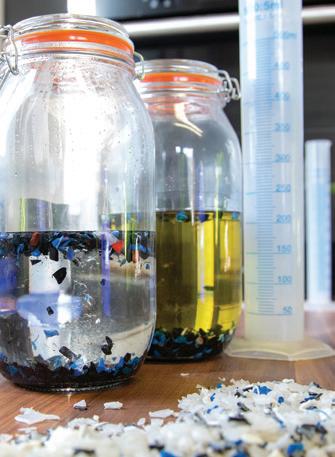
Brussels and other jurisdictions. For example, the Single-Use Packaging Directive has reduced throwaway plastics, which means we have much less weight of plastic being thrown away. There are now many important schemes supporting these efforts, which is essential as we go forward.
What does winning the SFA Award mean for the company?
JL: It was absolutely unexpected. This is the third time we’ve been a finalist in the SFA Awards and it was just fabulous to take part. We weren’t expecting to win our category and certainly did not expect to win overall, especially in a room with such incredible businesses. These are the backbone of the Irish economy, fueled by incredibly passionate people who drag themselves out of bed 360 days a year to put every ounce of effort into the business and for our activities to be considered as the best among those was extraordinarily humbling.
And it clearly meant a lot to your team
JL: Yes, the other aspect of it was from our team’s perspective. We employ 45 people and very few of them are customer-facing and get to experience how we are perceived in the world. So the accolade and the esteem that they get from realising and being aware of their efforts contributed to our business being recognised as one of the best in the country, which has been enormous. I’ve seen how many of the team are just that little bit more engaged – they’re more
confident about their work, they’re even more proud of what they do and that’s a real boost.
For those early entrepreneurs wanting to make a mark, what words of wisdom can you share?
JL: Anyone who starts a business, whether it’s in the environmental sector or any sector, is incredibly brave and deserves a huge amount of support and applause because taking the first steps is really hard. But nobody starts without taking those first steps. So I suppose one piece of advice is to, as Nike says, Just Do It – you’ve got to get going. You have to start making your mistakes and learning from them. Effectively, business is just a bunch of experiences where there’s slightly fewer mistakes than positive outcomes. You keep going, learn from them and try to make incremental progress. We’re celebrating 20 years of business this year and we were probably 15 years in before we could look at it and go, that’s a solid, sustainable business that can take care of itself. So it takes a long time for things to mature.
Can you share details about what’s next for the company?
JL: Just doing more of what we do, adding additional value to products and processes to make them more appealing to our customers. This is everything from trying to find additional strings of material that might be leaking into rented disposal routes and recovering them and recycling software, to trying to make our
“BY RECYCLING ENOUGH WASTE PLASTIC TO FILL ALMOST 1000 OLYMPIC-SIZED SWIMMING POOLS, THE COMPANY IS SAVING 80,000 TONNES OF CARBON EMISSIONS.”
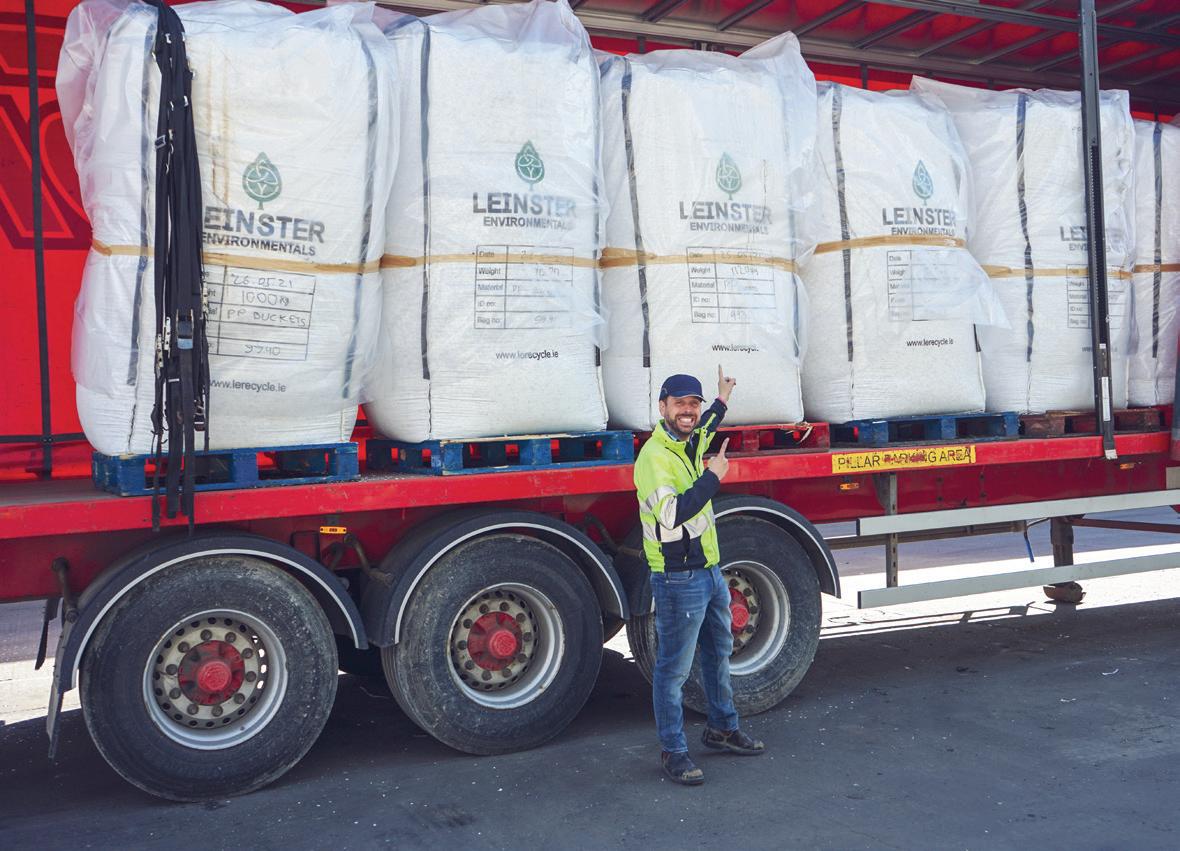
operations more efficient and more productive. For example, by the end of the year, 50% of our energy will be generated from an onsite solar array. We will have upgraded our finished product by sorting it optically into various colour fractions, which is a new process we haven’t had before. We also want to upgrade our laboratory and testing centre so that we can provide our customers with a greater level of confidence in what we produce. So we’ve got quite big plans for the rest of the year. And then, in 2025 and 2026, we have a new building scheduled to begin construction. We’re very much looking forward to a busy couple of years. We have a great team around us who very much want to drive this business and these projects forward. We look forward to being here and in another four or five years’ time, having progressed the business to a significant degree.








Suppo r t loc a l to l i ft us a l l




All Ri s e All Ri s e


Ch am p i o n G r ee n . i e








Marina Bleahen CEO, Business Works
INCREASE YOUR SALES, PROFIT, BUSINESS SUCCESS AND TALENT RETENTION WITH THE BUSINESS WORKS LACE FRAMEWORK, WRITES MARINA BLEAHEN
In the fast-paced and competitive world of business, staying ahead of the game is crucial for long-term success. e Business Works LACE framework is a proven methodology to deliver results, combining strategy and culture to deliver stress-free success. Focus on Leadership, Alignment, Accountability, Culture and Engagement so that you and your team Execute with Excellence.
E ective leadership is the cornerstone of business success. By embracing transformational leadership, business leaders can inspire and motivate their teams to excel. Transformational leaders empower their employees, foster a culture of innovation and creativity and encourage continuous learning and development. By embodying these characteristics, leaders can drive positive change, increase productivity and boost sales and pro ts. As a leader, you get what you tolerate. Are you being assertive in the drive for results?
In today’s rapidly evolving business landscape, with remote working the new norm, ensuring your team is aligned to clari ed targets, results and culture is critical. To have Alignment, working to a documented operational plan backed up with sales and pro t targets set out for monthly and quarterly review, is essential. We help clients create their 90-day plan, setting out the plan for sales and marketing, where we test and measure the number of leads, calculate conversion rates by salesperson and product/ service, measure average spends and complete pro t analysis so that we can create a plan for predictable pro t. Clarity and communication of the plan will deliver success. Understanding how you and your team communicate is important. At least half the population are indirect communicators, meaning no one is on the same page, which impedes success. Build a team pro le of communication styles and watch your business ourish as people work better together.
Do not stress if you do not have your operational plan documented and communicated; now is the perfect time to start. “BE” the leader, act today, know your numbers, share with your team and Align. Can you imagine watching a match or sport of any kind and not know the score? If you and your team do not review real-time information, you have a wonderful opportunity to transform your business success.
A strong and positive organisational culture is essential for success. Cultivate a culture that values integrity, collaboration and accountability. Encourage communication, recognise and reward outstanding performance and prioritise employee well-being. By creating a supportive and inclusive environment, businesses can attract top talent, enhance employee satisfaction and drive overall success.
Engaged employees are more motivated, productive and committed to their organisation’s success. Implement strategies to enhance employee engagement, such as providing opportunities for professional growth, soliciting and acting on feedback and promoting a healthy work-life balance. By prioritising employee engagement, businesses can reduce turnover, foster loyalty and improve their bottom line. 34% of labour cost is wasted through poor employee engagement (Gallup), o en the result of weak leadership. As a leader, you get what you tolerate, so set the standard and BE the BEST you can BE.
By leveraging the Business Works LACE framework, you can set your business on a path to sustainable growth, increased sales, higher profits and greater employee retention. Through e ective leadership of positive organisational culture and robust employee engagement, businesses can navigate challenges, seize opportunities and emerge as industry leaders.




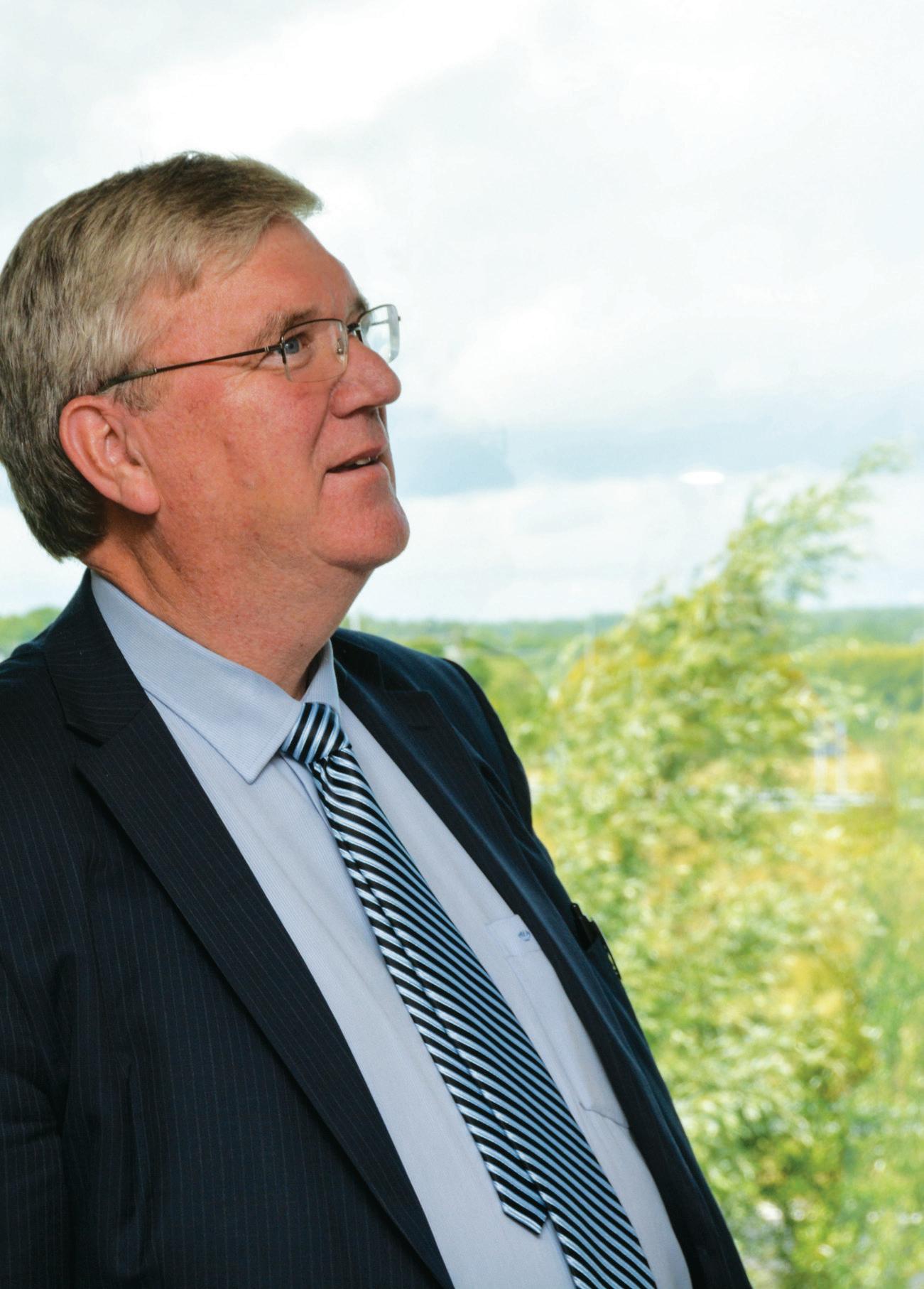


























IN MAY, THE SFA ATTENDED A CONFERENCE ON ACHIEVING EQUALITY AT WORK ORGANISED BY THE IRISH HUMAN RIGHTS AND EQUALITY COMMISSION
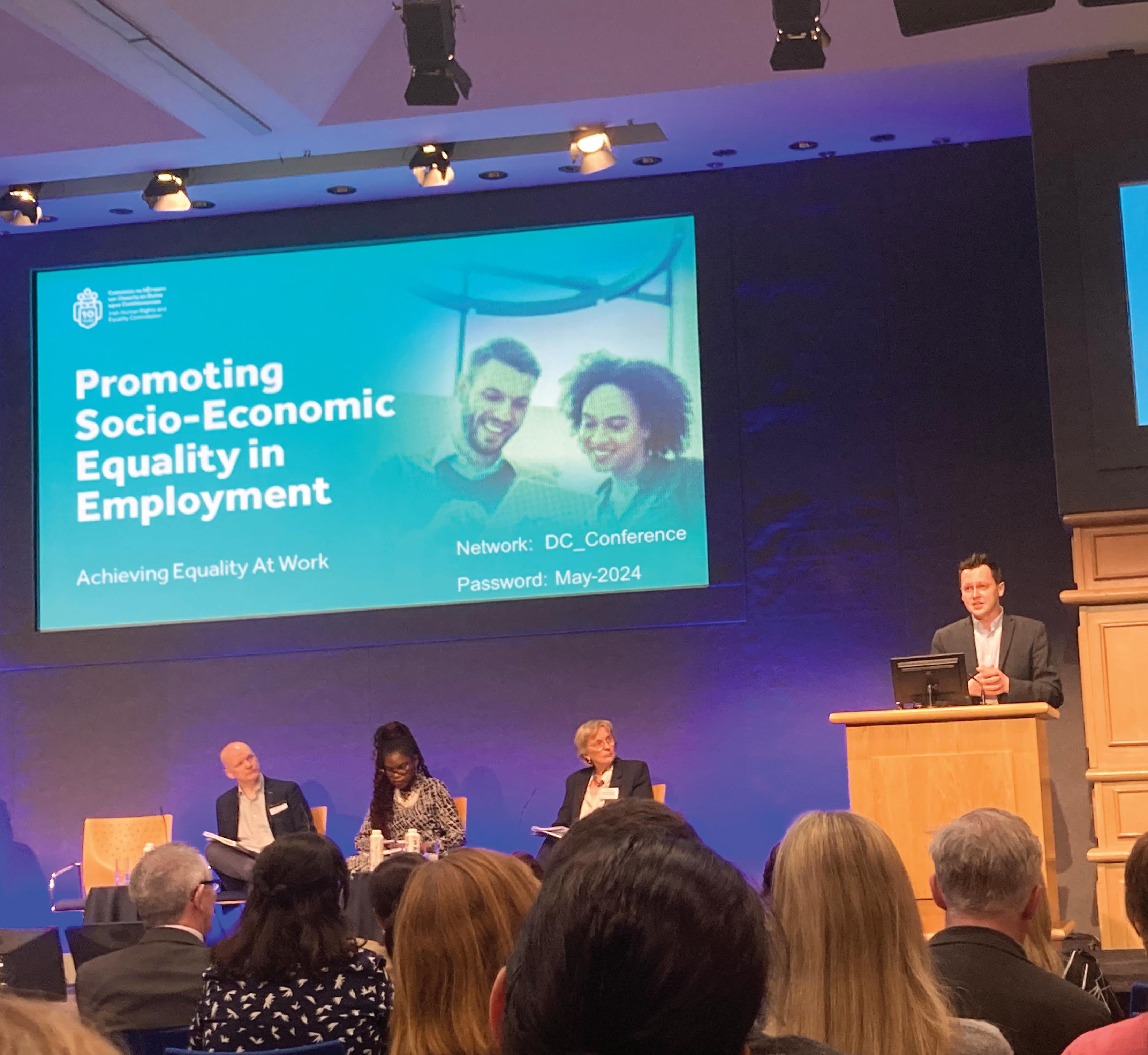
The purpose of the ‘Achieving Equality at Work and Promoting Socio-Economic Equality in Employment’ Conference was to gather public and private employers and employees, civil society organisations and rights-holder groups, trade unions, policy-makers and researchers, to discuss how to promote more inclusive workplaces, free from discrimination.
Speakers of note included Adam Harris (pictured), Chief Executive Officer, AsIAm, Dr Ebun Joseph, Director, Institute of Antiracism and Black Studies, Bríd O’Brien, Head of Policy and Media, Irish National Organisation of the Unemployed, Senator Lynn Ruane and Professor Olivier De Schutter, UN Special Rapporteur on Extreme Poverty and Human Rights (via a video).

Zaynab Lawal, SFA HR Executive, hosted a panel discussion featuring representatives from the Department of Social Protection for members and non-members of the Small Firms Association (SFA). The discussion centred on the Pension Auto-enrolment Scheme, due to commence next year. With expert guidance and an in-depth Q&A session, attendees were equipped with essential knowledge and advice to navigate preparation for auto-enrolment. The dynamic session not only empowered attendees with significant updates, but also generated discussion within the business community. The SFA will continue to keep our members informed on upcoming changes and announcements concerning pension auto-enrolment.

David Broderick represented the Small Firms Association at the National Economic Dialogue (NED) in Dublin Castle in May. The National Economic Dialogue is the annual meeting of the Government and stakeholders representing business, unions, academia and environmental groups, amongst others. In his address to the NED, he stated that two businesses a day went bust last year as firms struggled to cope with rising costs. David Broderick also said small businesses accounted for 85% of “all shutdowns”. At the NED, Taoiseach Simon Harris promised tax cuts and welfare increases in the forthcoming budget.
















IRELAND’S SUCCESSFUL LIFE
SECTOR IS CREATING AN ECOSYSTEM THAT’S RIPE FOR START-UPS AND RELATED BUSINESSES TO THRIVE










has been thriving for years, with thanks in no small part to the tenacity of IDA Ireland in attracting foreign direct investment – nine of the world’s top 10 pharmaceutical companies have a home here, as well as 14 of the top 15 medtech companies. The sector employs 40,000 people and notable clusters have sprung up across the country, from Galway’s medtech scene (boasting 39% of the regional distribution of medical device employees in Ireland) to the M1 Corridor (which is home to a plethora of major life sciences players from Abbbott to WuXi Biologics).
While most people are already aware that the vast majority of the world’s supply of Viagra is










manufactured by Pfizer in Co Cork, here’s a lesserknown fun fact for your next table quiz – 33% of the global supply of contact lenses is made in Ireland, thanks to Waterford’s Bausch & Lomb.

The pandemic brought further boom times to Ireland’s life sciences sector with Pfizer, Janssen, AstraZeneca, Sanofi and MSD facilities in Ireland all contributing (to varied extents) to vaccine production.
With all the major activity in Ireland, a thriving scene has grown up around adjacent businesses and start-ups, which would otherwise not exist, without this vibrant ecosystem and supportive environment.


With 20 years’ experience building within the life sciences sector, Wexford man Gary O’Sullivan set up Oseng in 2018 in Claremorris, Co Mayo, to service the thriving cluster on that side of the country. “I found there were no companies servicing the West of Ireland other than ones from Dublin or Cork, so we found a very nice home for ourselves here,” O’Sullivan says. Now, 90% of the company’s work is in the life sciences sector.
“Most of our growth is from the life sciences sector and their investment over the last number of years,” he says. “A lot of it was driven by Covid and we saw a lot of investment over the pandemic. We’re seeing a lot of R&D projects develop further into large scaleup projects. We’re trying to grow our team around that within this sector in Ireland, but also to follow our clients across to Europe or back to the US, which is the long-term plan.”
It’s a plan that has been successful for many Irish companies who have impressed FDI clients in Ireland and won contracts across multiple international sites on the back of it.
Now that the pandemic vaccine development race has subsided, he says: “A lot of our clients have products in clinical stages at the moment and they are now starting to develop into actual projects, so we’re seeing some major investment from our clients here in Ireland.”
Other major issues for his clients in the sector are utility infrastructure and power, as well as delays in expansion due to planning permission hold-ups. “We as a country need to develop our infrastructure to allow our clients to continuously grow.”
For both them and their clients, staffing to allow for continued expansion is a challenge. “The speed of delivery of projects is increasing. Our clients are looking to get projects completed faster so they can get their products to market faster. That’s a staffing and resourcing issue – we’re a small country and everyone is pulling from the same pool.”
Using 3D design software and AR headsets to review designs is already part of how they work, but Oseng is taking it one step further. “We’re developing our own tools for project management, design and construction management to support what our clients need. We decided rather than wait, we would build it ourselves. To speed up delivery we have to be digital, we have to have our documentation available at the click of a mouse.”
They’re also supporting clients with more stringent ISO standards around clean rooms,

“OUR CLIENTS ARE LOOKING TO GET PROJECTS COMPLETED FASTER SO THEY CAN GET THEIR PRODUCTS TO MARKET FASTER. THAT’S A STAFFING AND RESOURCING ISSUE – WE’RE A SMALL COUNTRY AND EVERYONE IS PULLING FROM THE SAME POOL.”
improving infection control, air quality and energy consumption of their plants.
“We’re involved in the ASHRAE society, which is developing standards on infection control, and we’re trying to bring that knowledge from the US to our clients here by assisting with CPDs and webinars, as well as increasing our knowledge base in that space.”
“We’ve had a pandemic, we may have future strains and we have to be able to evaluate how our designs are capable of providing sufficient air quality for infection control – that’s critical for our clients.”
Having just returned from a European health summit when she spoke to Better Business magazine, Sonia Neary, founder of digital health company Wellola, was enthused about the ecosystem her company operates within. “From medtech to pharmatech, none of the components live alone,” she says. It’s an advantage we have as a small country, that clusters are quick to form.
Neary says the east coast is catching up on Galway’s BioInnovate Fellowship programme now. “Little by little, Dublin is becoming more of a digital health hub.” She namechecks Carl Power, the Programme Director of the recently launched DigiBio Healthtech Innovation Fellowship in Dundalk Institute of Technology as an influential figure in the space.
“HEALTHCARE IS STILL IN THE 1950s BUT THE TECH THAT’S AVAILABLE IS IN 2050!”
Sonia Neary, Co-Founder and CEO, Wellola

“It’s the same model as BioInnovate where people with healthcare backgrounds, engineers, scientists and academia come to the table and brainstorm around the key needs in this space that aren’t being met and come up with solutions in that arena,” she explains. “I think Dundalk and Leinster are starting to solidify themselves more in the digital health arena.”
With Galway’s hardware and medtech history and the presence of “all the key players – the Pfizers and the Roches and all of these amazing life sciences companies across the country”, Ireland has a presence on a global scale.
Wellola’s own presence is expanding, with a subsidiary in the UK based out of Leeds, on the grounds of the University Hospital. To Neary, “that northern powerhouse region is seen as a space for emerging technological scale-ups” which matched the energy of their Dublin home in the Guinness Enterprise Centre (GEC). “We actively tried to find a place in the UK that would be an exciting melting pot for us to grow from; both in Ireland and the UK, that’s been our experience, with the GEC healthcare cluster.
“With Trinity College, St James’ and the new children’s hospital right on our doorstep, Paul Anglim and a handful of other experts in GEC are trying to solidify opportunities for start-ups to export from that supported hub.”
She likens the importance of clustering for life sciences companies to a patient’s personal healthcare. “Most of us have dependencies on a multidisciplinary team in some way, shape or form; you’ve got your GP and your pharmacist,” she notes. “It’s not an arena where anyone really survives alone; it’s an ecosystem.
“From analogue care, digital care, pharmacological care, device supported, monitoring, diagnostics, treatments – it’s very codependent,” she says. “You never really thrive alone.”
Looking forward to how the industry will evolve, she says, at this point, “Healthcare is still in the 1950s but the tech that’s available is in 2050!”
Neary sees the capabilities and limitations of using advanced technologies to change healthcare. “AI in diagnostics is a no-brainer,” she says.
Aggregating the data, standardising how it’s structured and using that diagnostically can do more with greater accuracy than humans, but she is still wary that we are not yet at a stage to deliver treatment via AI.
To best leverage available technologies in order to improve healthcare, Neary says we need to shift models of care from treatment to prevention. “It’s a whole cultural shift in thinking and behavioural change.”



Sustainability isn’t just good for the planet – it can also be good for business. From optimising resource use to integrating energy-efficient technologies, savvy business owners are finding ways to cut their costs and boost their bottom line. Suzanne Leamy, Product Development Manager with the Strategic Banking Corporation of Ireland (SBCI), is keen to pass on the message to small business owners that the SBCI is funding business investment in sustainability, which will ultimately decrease operational expenses, enhance your market competitiveness and drive substantial economic growth.
The SBCI’s raison d’être is to make it easier for Irish businesses to get the funding they need, when they need it. “We bring more affordable credit to small- and medium-sized businesses and increase competition and choice for borrowers,” says Leamy.
“Sustainability has become increasingly relevant for Irish SMEs and adopting sustainable practices can result in significant benefits, including cost savings and an enhanced reputation with customers.”
In 2023, the SBCI launched the Growth and Sustainability Loan Scheme (GSLS) in collaboration with the Department of Enterprise, Trade and Employment and the Department of Agriculture, Food and the Marine. The Scheme has been designed to enable businesses across all sectors, including agriculture, to make longer term investments in sustainable measures as well as in growth opportunities, such as the development of new products and practices and the acquisition of machinery or equipment.
The Growth and Sustainability Loan Scheme will channel €500 million of lending to the SME market
through the SBCI’s lending partners. The Scheme has a specific target of at least 30% for investments in climate action and environmental sustainability.
The Scheme is available to Irish SMEs and small midcaps, including those in agriculture. It is designed to bridge the gap in longer-term financing, as well as accelerating the environmental sustainability of Irish businesses.
There are also options for businesses to qualify as a green enterprise where they meet the criteria in one of the following categories:
1. The SME is engaged primarily in sustainable activities, meaning it generated at least 90% of its revenue from eligible, sustainable activities
2. Farmers classified as a holder of a Green Eco Label, meaning that they are a certified organic farmer participating in the Department of Agriculture’s Organic Farming Scheme, or they are a farmer participating in both ACRES and Bord Bia’s sustainable farming programme, Origin Green.
Scheme loan rates vary between participating onlenders, with each lender providing a discounted interest rate to standard market rates. An additional 0.25% discount will be applied to businesses eligible in the category of climate action and environmental sustainability.
Businesses also benefit from the guarantee through other preferential terms, with loan repayment periods of seven to 10 years and reduced collateral requirements, with no security requirements on loans up to €500,0000. The availability of unsecured loans aims to promote financial inclusion, particularly for segments of the market that lack collateral which may block them from accessing finance.
SMEs can borrow amounts from €25,000 up to €3,000,000, enabling them to implement strategic changes and invest in the growth of their business.



Loans under this Scheme can fund investments in tangible or intangible assets, machinery or equipment, research and development, business expansion, premises improvement and innovation. Irish businesses investing in sustainability can increase their competitiveness, reduce their energy consumption and enhance their brand reputation by focusing on several key areas fundable through this Scheme, such as the following:
Projects related to renewable energy such as solar panels, small-scale wind turbines and geothermal heat pumps, alongside related components and installation expenses
Construction or renovation of commercial buildings to improve energy efficiency, including insulation, window and/or door replacements, energy-efficient heating, ventilation and air conditioning systems, as well as smart meters
Investments in technology, equipment or machinery aimed at significantly reducing energy consumption and greenhouse gas emissions, including electrical equipment, variable speed drives and modernisation of irrigation networks
Investments in low and zero-emission transport assets, including the acquisition of electric and hybrid commercial and passenger vehicles and the implementation of transport infrastructure for clean energy vehicles.
There is a two-step application process whereby SMEs apply for eligibility to the Scheme with the SBCI and following this, make their loan application with a participating lender.
An automotive dealership in Munster began implementing their environmental strategy by leveraging the Growth and Sustainability Loan Scheme. The discounted interest rates and longer loan term of 10 years has enabled them to invest in sustainable measures to grow and evolve their business model, such as the installation of solar panels and the integration of EV charging stations. Installation of solar panels resulted in considerable operational and environmental savings, estimated to save €8,000 a year and 26,555kg of CO2 emissions. The incorporation of EV charging stations also allowed them to support their electric vehicle inventory and promote the use of EVs to both employees and customers.
Overall, the Growth and Sustainability Loan Scheme has enabled the business to invest in their environmental strategy, doing their part to lower emissions, cutting costs for their business and providing a better service to their customers.
A clothing rental business in Leinster dedicated to combating fast fashion and waste through the circular economy utilised the Growth and Sustainability Loan Scheme to expand their business. The business qualified as a Green Enterprise as the income generated is concentrated in eligible sustainable activities, allowing them to access the more attractive loan terms and discounted interest rates.
They made an investment in new equipment that will allow them to maintain the pre-used clothing that is rented to their clients, increase rental inventory and grow their workforce by hiring two additional employees.
The Growth and Sustainability Loan Scheme has facilitated both business growth and the promotion of sustainable practices within the fashion industry, reinforcing the benefits of the circular economy model.
The application form will ask you for information such as the number of people you employ, your annual turnover, your CRO or VAT number and if you are a farmer, you will need to input your herd number. You will also be asked to input a description of the project you plan to finance and an estimate of relevant costs.
Once the online eligibility application has been completed, qualifying businesses will be issued with an eligibility code (valid for six months) that they need to provide to the lender as part of the loan application.
For more information, visit sbci.gov.ie

Legalbattles are an expensive and stressful process to enter into and for a small business it can prove ruinous. It’s often said that even a bad agreement is better than a good lawsuit and for a small business with a dispute, whether that be with a current or former employee or against another party, mediation can be a more cost-effective way of sorting out the issue. It’s also not the only option – there is another process, called independent intervention, which can also prove useful in sensitive matters and conflict resolution.
According to HR compliance and governance expert Carol Ann Casey, founder of CA Compliance, “Mediation and independent intervention are both methods used to address and resolve conflicts or issues – however they differ in their processes, roles and scope. Depending on the matter, business owners could choose mediation where parties voluntarily engage in the dispute resolution process or have a more facilitated process where an independent intervenor ultimately proffers a decision and recommendations on the matter.”
“Mediation is a structured, voluntary process in which an independent and impartial third party, known as a mediator, facilitates communication and negotiation between disputing parties to help them reach a mutually acceptable agreement,” Casey outlines.
In the UK, almost 80% of commercial disputes are settled using mediation and it is growing in popularity across Europe. Since the Mediation Act 2017 came into operation, solicitors are obliged to advise clients to consider mediation in advance of issuing legal proceedings. A court can also invite parties to consider it as an option.
“Mediation offers a range of benefits that make it an attractive option for resolving disputes. It is costeffective, time-efficient, confidential and allows parties to maintain control over the outcome while preserving relationships and reducing stress.”
According to the Irish Commercial Mediation Association (ICMA), it’s estimated that the cost of mediation is approximately 20% of the cost of going to court.
The mediator does not have any decision-making power – they facilitate dialogue but cannot impose solutions. “Their role is to assist the parties in identifying issues, exploring options and finding common ground,” says Casey.
Participation in mediation is voluntary, with parties agreeing to engage in the process and work towards a resolution. “The sessions are usually confidential, encouraging open communication without fear of
repercussions,” Casey notes. “It is often used in disputes such as family conflicts, workplace issues, community disputes and commercial disagreements on which the parties agree to mediate.”
The best-case scenario from going through the mediation process is a mutually agreed-upon resolution. “This may or may not be legally binding, depending on the agreement between the parties,” says Casey.
Independent intervention differs from mediation in that it can be mandated in some situations and the decisions may be enforceable. Casey explains: “Independent intervention involves actions taken by an independent and impartial third party to address a conflict or issue that may empower authority to investigate, provide recommendations or enforce decisions.”
The “intervenor” may be a recognised expert or independent body and may have the authority to make decisions, provide binding resolutions or offer recommendations. Their role can vary from advisory to authoritative, depending on the context.
“Independent interventions can be initiated by an external body with the mandate to act impartially,” says Casey. “This can include regulators, auditors or international bodies. Independent interventions can also be mandated to a specialist to disseminate facts and provide a structured decision with recommendations to resolve the conflict or deadlocked situation.”
Unlike mediation, participation in an independent intervention is not always voluntary for the parties involved. It can be mandated by law, governing frameworks or organisational policy such as terms of reference agreed by the directors of the company.
“Independent interventions often involve formal processes with established protocols, ensuring transparency and accountability,” says Casey, while outcomes can include binding decisions, recommendations for action or formal reports. “The intervenor’s findings and actions can have significant implications,” she notes.
Independent intervention is commonly resorted to in workplace matters, especially where mediation has not been acceded to by parties or where a more structured facilitated approach is considered advantageous, Casey explains. Other contexts include matters of regulatory compliance, corporate governance or legal disputes.
“Independent intervention offers significant benefits by providing impartial, expert and credible solutions to conflicts and issues,” says Casey. “It enhances trust, ensures compliance and can lead to sustainable, longterm resolutions. Whilst it can be more expensive than self-decided mediation it is less expensive than legal proceedings, providing a credible impartially-decided course of action that can be time-efficient, confidential and stress-reducing.”











In summary, while both mediation and independent intervention aim to resolve conflicts, mediation emphasises voluntary facilitated negotiation that is commonly used, whereas independent intervention can involve more decisive or authoritative actions by an impartial third party. “It is advantageous for all parties to resolve the conflict or have a structured facilitated approach,” says Casey, noting that if these approaches fail, the next step is likely to be costly legal proceedings, be it in a tribunal or court.
The perennial question of what to look for in a mediator often arises – some err on the side of sector-specific knowledge, while others argue for the importance of demonstrated ability to resolve cases, regardless of industry. There are a wide range of factors to take into account, according to Casey. “Choosing the right mediator or independent intervenor requires careful consideration of their expertise, impartiality, reputation, communication skills, problem-solving abilities, process, confidentiality, cost, outcome focus and compliance knowledge. By thoroughly evaluating these factors, a business owner can select the best equipped person to handle their specific situation effectively and equitably.”
Carol Ann Casey is a HR Compliance and Governance Specialist who expertly handles sensitive matters such as resolving con ict, conducting independent interventions, mediation and independent investigations on matters such as protected disclosures, grievances, harassments, governance, board con icts and HR compliance www.cacompliance.ie






Carol Ann Casey outlines the key differences between mediation and independent intervention
Decision-Making Power Mediators facilitate dialogue without making decisions, while intervenors provide their decisions and may, depending on the matter, have the authority to make binding decisions or enforce outcomes.
Voluntariness
Mediation is voluntary, whereas independent intervention can be mandated.
Process Mediation focuses on mutual agreement through facilitated negotiation, while independent intervention may involve investigation, recommendations or authoritative decisions.
Confidentiality Mediation is often confidential, while independent interventions may be more formal and transparent.

1 2
Angela Ennis Managing Director, Ennis Safety Wear Ltd
Start on your entrepreneurial journey with genuine passion and commitment. Our business originated from an unwavering desire to make a positive impact. Focused on excellence, we aimed to deliver exceptional services, letting customers experience the transformative difference. This demanded a dedicated team sharing our core ideology. Always recognise the collective contributions of every individual – customers and employees – as the foundation of a successful enterprise.

Eamon Gallagher Founder and Managing Director, IT.ie
When your business starts to grow, it gets very easy to stray too far from the product or service that brought you the success you are now enjoying and which sets you apart from your competition in the first place. Align your growth journey to the ear of your customer at all times and never lose sight of these values which differentiate your offering.
3

Shane McQuaid Portfolio Marketing Manager, Deep RiverRock
There will be times where you will have to navigate the balance between your own intuition versus the feedback of others. Trust your instincts but don’t overlook the potency of unbiased external feedback. Your biggest critic often provides the strongest insights. Seek it out – it fuels positive action.
Failure is the condiment that gives success its flavour





4 5 6
John O’Shanahan Managing Director, LeanBPI
Digital in small businesses is essential for survival and growth - but there are many challenges to its implementation. Measuring personal digital readiness is an important step in identifying the best way to go Digital and understanding readiness levels helps select the right tools and an appropriate pace of implementation. A digital champion should be appointed, to lead efforts to implement systems based on readiness levels and to foster a growth mindset and a positive attitude to technology.
Maeve Dorman Senior Vice President, Global Merchant Services, PayPal
Success for any business starts with knowing your audience. Today, people crave convenience and prioritise security. That means being able to browse, select and purchase goods or services at the touch of a button. It also means businesses need to deliver superior shopping experiences, which means a frictionless checkout combined with personalised offers and incentives. This has the power to nurture satisfaction, loyalty and growth.
Paul Phelan CEO, Data Edge
Spread your company’s risk and don’t put all your eggs in one basket. Remember the customer relationship is your real value – your supplier won’t ever have that, so keep in mind how important it is when you’re pushing for bigger margins. Always Be Brave – make quick informed ‘gut’ decisions and keep the key decision making process down to a minimum number of team members.













JOINING THE BACKING BUSINESS COMMUNITY GIVES SMALL FIRMS A PLATFORM TO LEARN AND GROW.
DEBBIE BEHAN AT VIRGIN MEDIA BUSINESS TALKS TO BETTER BUSINESS ABOUT THE INITIATIVE AND WHY IT’S PROVING A GAMECHANGER FOR SO MANY SMALL FIRMS ACROSS THE COUNTRY
That’s why the company established the ‘Backing Business Community’, an initiative conceived during Covid to empower small firms to move forward and thrive, despite a shifting, unpredictable economic landscape. From the off, the initiative has achieved exactly what it set out to do, namely give small firms a platform to market their goods or services and create a community where businesses can share experiences and knowledge and gain access to invaluable resources.
“During the pandemic, we could see how much our small business customers were struggling. It was such a challenging time for small firms, who were finding it difficult to get their message out there while keeping their business afloat. It was then that we established the Backing Business Community, which immediately
created a hub for over 850 small firms to gather, to talk about their experiences and to benefit from our support. Our members, who are also Virgin Media Business customers, have had the chance to appear in dedicated slots on Virgin Media Television or have featured for free in digital and print media, which for most people is a once in a lifetime opportunity,” says Debbie Behan, Business Products, Sales and Marketing Manager at Virgin Media Business. Providing these small firms with a national platform has been a gamechanger, says Debbie. “Their businesses have come on in leaps and bounds. For many of them, their products or services are now available nationwide. We’re in the business of being a business ourselves and so we know what the landscape is like and how difficult it can be to grow and really develop. We can offer small firms this unique platform, which is something our competitors can’t do. Through our TV station, we’ve been able to boost a significant number of businesses and that’s something we want to continue.”
Virgin Media Business is inviting more small firms to join the community and take advantage of the many benefits it provides.
“This is a free initiative and you don’t have to be a Virgin Media Business customer to join the community. We will provide as many experiences, events, opportunities and resources to members as we possibly can.” With the Backing Business Community, everyone is a winner, says Debbie. “For us, we’re getting our name out there. We’re having a positive impact on small firms and doing something good in the community, which is really important to us. For small businesses, there are so many opportunities to publicise themselves, increase their market presence and really get their name out there.”
At the heart of the initiative is the creation of a vibrant community network, where SMEs can foster connections, share experiences and learn from each other. It’s a network that exists both online and inperson; a series of virtual events, webinars and panel discussions keep the conversation going between members, facilitating the exchange of advice and knowledge. All

At the Backing Business Community launch event earlier this year, three small firms took to the stage to talk about the impact the initiative has had on their business.
Shannon Forrest, co-founder of Rívesci, talked about turning a food truck into an award-winning condiment company. Rívesci products are now stocked in Super Valu, while Shannon has also opened a coffee shop in Clonmel.
Stephen Jiang of interior homeware brand Fervor+Hue has partnered with Expert Group, where his products are sold in over 55 of their shops across the country.
Susan Furniss-Radley, founder of Dust and Rock, has secured a deal with Brown Thomas and Arnotts to stock her wrist pockets and other products.

online and in-person events are recorded, easily accessible by members who might have missed a get-together or simply want to experience it for a second time. On the back of joining the Backing Business Community, members receive exclusive discounts on broadband services from Virgin Media Business, while monthly newsletters and updates ensure they don’t miss out on any news and events.
Increasing costs continue to impact small businesses. According to a recent survey carried out by the Small Firms Association, one in three small businesses will run out of liquidity within six months without additional funding. The research also showed an estimated increase of 16.6% in average business costs, while 51% said energy costs had risen in the past year. The
For almost 20 years, Virgin Media Business has been providing its customers with a top-class service. The company continues to roll out its full fibre network to business customers across the country and through a partnership with Siro and National Broadband Ireland, that reach will extend to even more areas of the country. “We can offer up to 2GB broadband on our full fibre network and we also provide full technical support to our customers. I think it’s that end-toend attention to detail that sets us apart from the competition and gives our clients peace of mind when they partner with us.”
This year, Virgin Media Business will be launching new products for its business customers. A WiFi extension will guarantee uninterrupted service for
“FOR US, WE’RE GETTING OUR NAME OUT THERE. WE’RE HAVING A POSITIVE IMPACT ON SMALL FIRMS AND DOING SOMETHING GOOD IN THE COMMUNITY, WHICH IS REALLY IMPORTANT TO US.”
“These three businesses are great examples of the impact the initiative can have. They’re all doing exceptionally well on the back of the assistance we gave them and we want to extend that help to as many small business owners as we possibly can.”
Debbie Behan, Business Products, Sales and Marketing Manager, Virgin Media Business
Paul McCarthy
effects of these increasing costs are being felt across the small business community, but they’re not the only challenge that small firms are grappling with. “Our customers are telling us they’re struggling with marketing. In the vast majority of cases, small firms are sole traders. They don’t have big teams and they don’t have the resources to devote to marketing. While they have a lot of faith and confidence in their business and products, they’re struggling to get the message out about who they are.” An in-person event in June focused on exactly that; how small businesses can leverage social media and other marketing techniques to increase their presence and grow their business. “We want to equip small firms with the knowledge they need to get their business and brand out there and stand out from the crowd.”
customers, while a new streaming box for B2B customers will also hit the market.
“Some of our residential customers will be familiar with those types of products, but we’re putting a business spin on them and they’ll be rolled out on our full fibre network.”
Signing up to the Backing Business Community is a no-brainer, says Debbie. “It just makes sense. One draw is that it’s free; there are no charges associated with becoming a member. It provides small businesses with the opportunity to become part of the conversation, to share their struggles and learn from their peers. Our Virgin Media Business customers that have appeared on the Ireland AM couch have really felt the impact; they’ve had their phones ringing off the hook. We’re so excited to see the impact we’ll have on the next batch of small firms.”

NAMED LAWYER OF THE YEAR AT THE 2024 DYE & DURHAM IRISH LAW AWARDS, AOIFE MCCARTHY AT DOUGLAS LAW SOLICITORS TALKS ABOUT DISTINGUISHING HERSELF IN THE LEGAL WORLD
What does it mean to be named Lawyer of the Year?
I am extremely honoured and thrilled to receive the award for Lawyer of the Year 2024 at the Dye & Durham Irish Law Awards and I am very grateful to have been chosen by such an esteemed judging panel. It’s all a bit surreal to be honest!
What do you attribute the win to?
I attribute the win to a number of great people in my life. My husband, Richie Cunningham, is my main champion so I must give him due credit. Without his support and encouragement along the way, I would not have gotten to where I am today. My two business partners, Gráinne O’Donovan and Teresa

O’Sullivan, have been integral to the success of the practice and my winning the award, as have the entire team at Douglas Law, including Juliane Ramos dos Passos, Legal Executive, who works very closely with me and is like a ray of sunshine every day. My clients entrust me to achieve successful outcomes for them during what can be very stressful times in their lives. I often work with barristers, including Cian Cotter BL who is excellent in his approach and instrumental in working with me to achieve the best results for clients. Also, of course, my own hard work but it is definitely a combined effort!
Can you tell me about your career so far?
I qualified as a solicitor in 2010. Gráinne O’Donovan, Teresa O’Sullivan and I established Douglas Law Solicitors in 2015, having worked together for many years prior to that. We moved to a new office premises at the end of 2023 to accommodate our expanding business and increasing team. The firm won the prestigious Munster Law Firm of the Year in 2023, another great achievement and an acknowledgment of the fact that we have become one of the leading private client firms.
What led you to specialise in employment law and personal injuries litigation?
I have always predominately worked in litigation and employment law as I particularly enjoy dispute resolution and each case brings its own challenges. Over the past number of years, I have focused more and more on employment law, vindicating the rights of professionals from all different sectors, both in the public and private sector. Often, the employer/ defendant is a State entity or a large multinational with significant resources, which can be daunting for clients embarking on potential legal action. I reassure clients in relation to the process and give clear and practical advice in relation to realistic outcomes and timeframes. Our team at Douglas Law Solicitors ensure that there is an equality of arms in terms of the advice given and resources and time put into each case. My aim is to find the best outcome for the particular client. If it can be achieved, a relatively swift conclusion is of great benefit to employees who have had workplace issues for some time as it allows clients to move on with their lives. All of that can be challenging, but I get a great sense of achievement when we achieve the result in the end.
What do you love about your job?
My clients motivate me. Many of my clients have been through a difficult time in a work situation and are reliant on me to try and sort out their difficulties. This can often be a complex and delicate situation, but I always take the attitude that the vast majority of problems can be rectified and if you keep a
positive frame of mind and have the drive to see it through, that’s half the battle. I am incredibly lucky to have found a career where I feel energised by my work. My partners, Gráinne O’Donovan and Teresa O’Sullivan, inspire me and motivate me along the way and have been great mentors to me throughout my career. Despite the work being quite serious, we do manage to have some much needed lighthearted conversations during the course of the day!
What advice would you give a young person thinking about a career in law?
I would say surround yourself with people who will lift you up, encourage you and motivate you. Honesty and integrity is extremely important as your reputation is everything. Also, I believe that these days a good knowledge of running a business and valuing your time is also important, particularly if you have ambitions to work at partner level within a firm or run you own firm.
Is there a person that you feel has inspired you in your career?
My parents, Geoff and Eileen McCarthy, are both very entrepreneurial and run their own successful business in Fossa, Killarney, Co Kerry. I go to them regularly for both personal and business advice and have always felt extremely well supported and encouraged by them. My brother, Eoin McCarthy, is also an entrepreneur and sold his tech company in Australia a number of years ago having achieved huge success. Operating a law firm is as much about running a business as it is about advising clients and if you can do both well, you can distinguish yourself in the legal world.
Our ambitions for Douglas Law Solicitors are to establish ourselves as the leading private client firm in Munster and nationwide. Along with employment law, our other expanding areas are probate litigation (dispute about inheritance), family law, commercial law and medical negligence. We plan on expanding the practice and growing these areas further. We also plan to keep delivering excellence in the quality of our service and to expand our own knowledge so that we can continue to provide the best service to our clients.
Ag cur ardchaighdeáin d’iompar corparáideach chun cinn trí dhlí na gcuideachtaí a fhorfheidhmiú.
Promoting high standards of corporate behaviour through the enforcement of company law.

Tabhair cuairt ar ár suíomh gréasáin agus lean muid ar na meáinshóisialta le haghaidh eolas maidir leis an méid seo a leanas:
• do chuid dualgas agus oibleagáidí mar stiúrthóir na cuideachta,
• do chuid cearta mar bhall den chuideachta / mar scairshealbhóir,
• conas gearán, léiriú imní nó nochtadh cosanta a chur faoinár mbráid, agus
• deiseanna gairme linn atá ar na bacáin.

Visit our website and follow us on social media for information on:
• your duties and obligations as a company director,
• your rights as a company member / shareholder,
• how to submit a complaint, expression of concern or protected disclosure to us, and
• upcoming career opportunities with us.

OVER 400 FINALISTS AND WINNERS WERE IN ATTENDANCE AT THE INAUGURAL IRISH INVESTOR AWARDS, IN ASSOCIATION WITH MAZARS (NOW RENAMED FORVIS MAZARS AS OF 1 JUNE 2024)
IN MAY, members of the finance world gathered at the Irish Investor Awards, created by Mazars (which has since rebranded to Forvis Mazars), which took place in the Round Room at The Mansion House Dublin, to celebrate and recognise excellence in the world of private equity and venture capital investment.
The event was hosted by Irish radio and television presenter Anton Savage and speeches were delivered on the night by Minister for Public Expenditure Paschal Donohoe and Tom O’Brien, Managing Partner at Forvis Mazars. Both spoke highly of the trailblazing winners on the night and commented on how the Irish Investor Awards are set to become a regular fixture in the investment calendar, thanks to the quantity and quality of submissions received in the first year.
Finalists and winners were decided by an executive board of 24 judges, made up of some of the most established and wellknown names in the finance world.
Commenting on the prestigious event, John Bowe, Partner at Forvis Mazars, said: “We were delighted to establish the Irish Investor Awards. Irish and international

“At Forvis Mazars, we believe this awards programme was long overdue as a way to celebrate their achievements and the invaluable contributions of other stakeholders such as advisors, debt providers, diligence professionals, and corporate lawyers, whose collective expertise is instrumental in making deals happen.”
John Bowe, Partner, Forvis Mazars

private equity and venture capital funds play a pivotal role as crucial funding sources and value-add partners for Irish companies and entrepreneurs seeking to cultivate leading enterprises within Ireland. At Forvis Mazars, we believe this awards programme was long overdue as a way to celebrate their achievements and the invaluable contributions of other stakeholders such as advisors, debt providers, diligence professionals and corporate lawyers, whose collective expertise is instrumental in making deals happen.”
Companies such as The Maples Group, who took home the ‘’Corporate Law Firm of the Year’’ award, stated they were “delighted to have been recognised for the sheer volume, value and scale of the transactions we advise
on. Congratulations to the team and all our clients”. Other attendees in the room, such as Elevate Partners, said: “It is great to see the investment and advisory space thriving in the Irish market and the emerging talent in the sector.”
Tom O’Brien, Managing Partner, Forvis Mazars, said: “The Irish Private Equity awards was an overwhelming success and a very fitting acknowledgement of the hugely important role that the private equity community plays in supporting indigenous Irish businesses. Institutional investors bring much more to the table than pure investment; they help to mentor business owners and leaders
across an array of issues from innovation to managing growth and scaling. It was fantastic to get the deals, investor and advisor community together for the night. There was a fantastic energy in the room that bodes well for the sector and the awards going forward.”
The Irish Investor Awards were sponsored by Duport Capital, Development Capital, The Business Post and headline sponsor and hosts Mazars. On the night, Mazars presented the Lifetime Achievement award to Michael Murphy, who held the role of Managing Director at Investec for over two decades and is currently a Non-Executive Adviser at the company.
“Institutional investors bring much more to the table than pure investment; they help to mentor business owners and leaders across an array of issues from innovation to managing growth and scaling. It was fantastic to get the deals, investor and advisor community together for the night. There was a fantastic energy in the room that bodes well for the sector and the awards going forward.”
Tom O’Brien, Managing Partner, Forvis Mazars


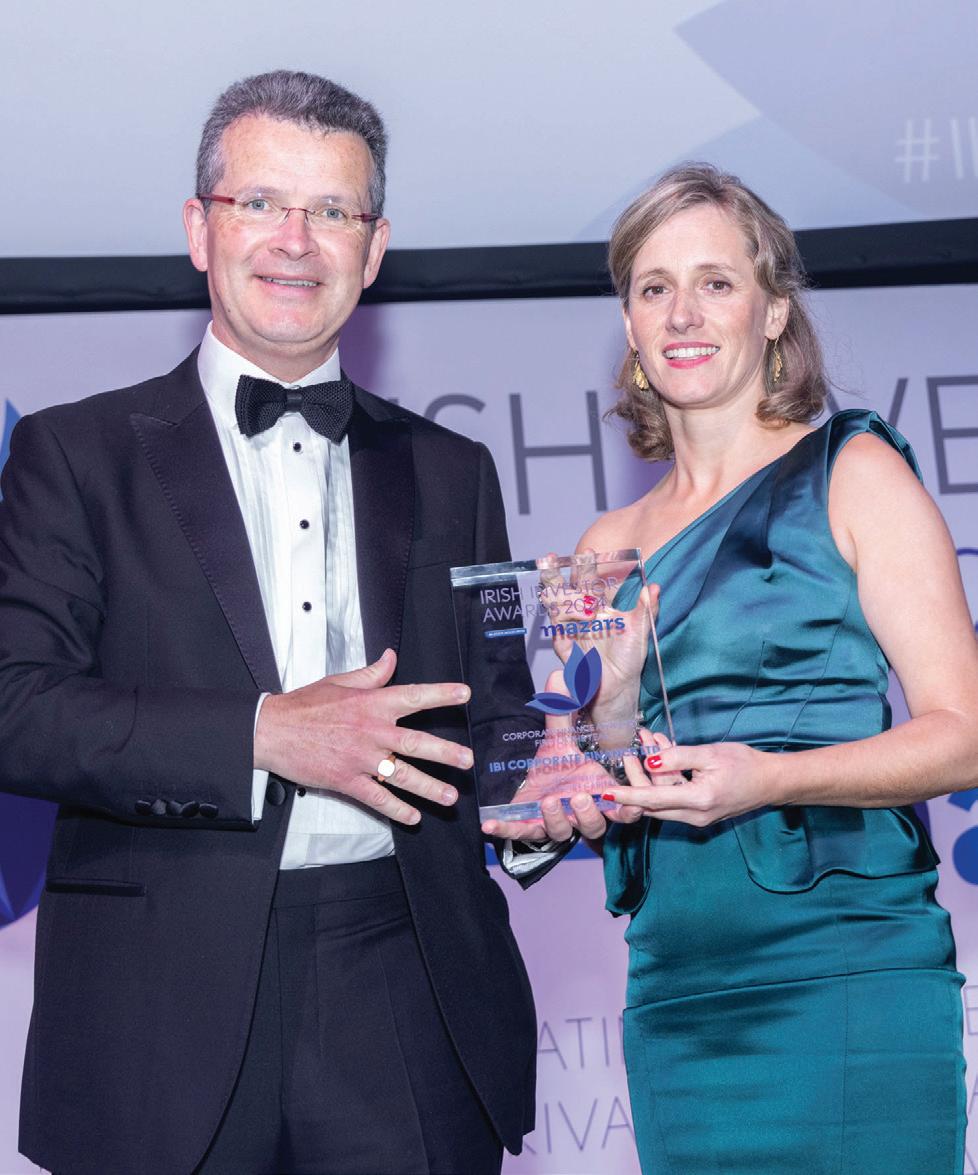



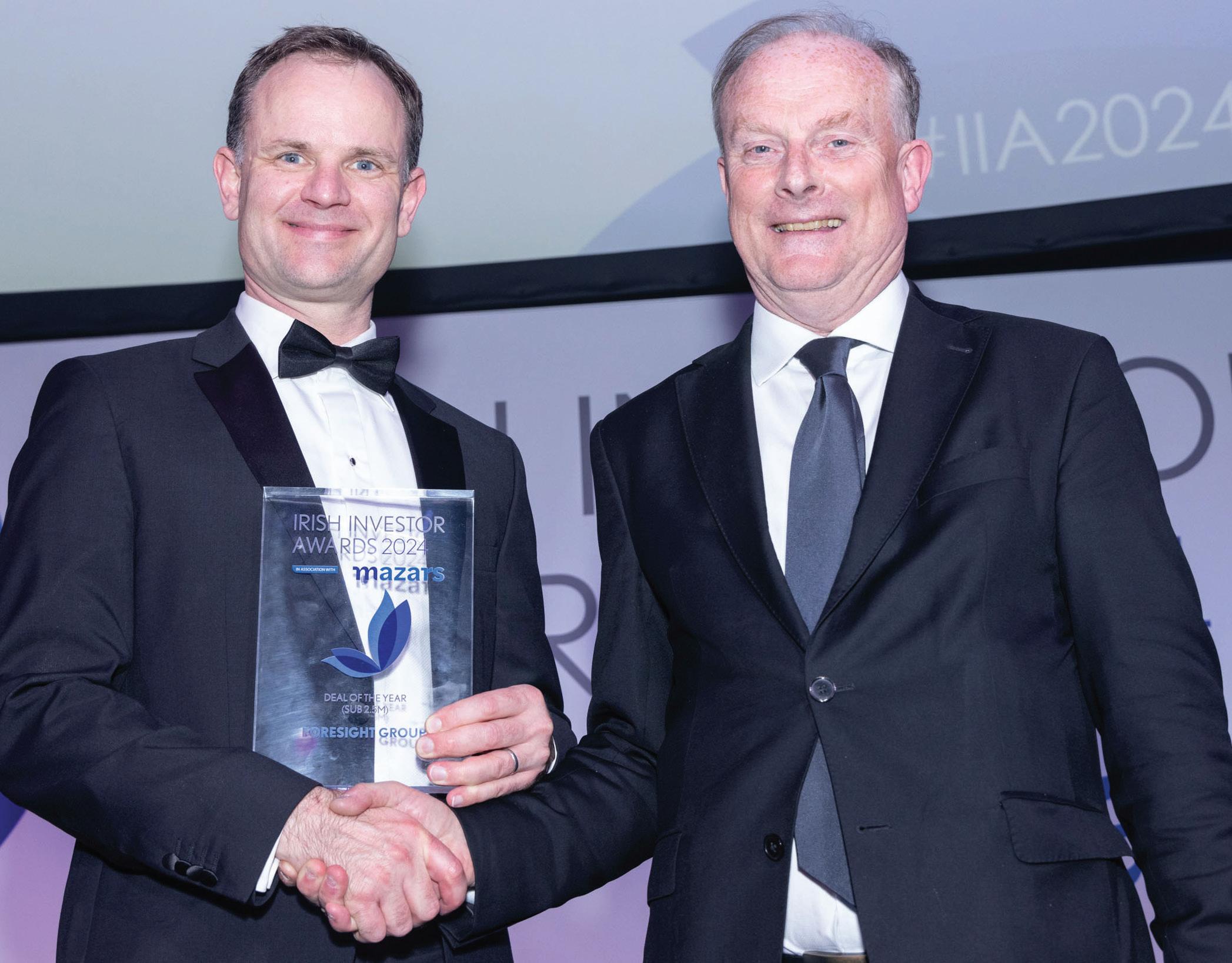



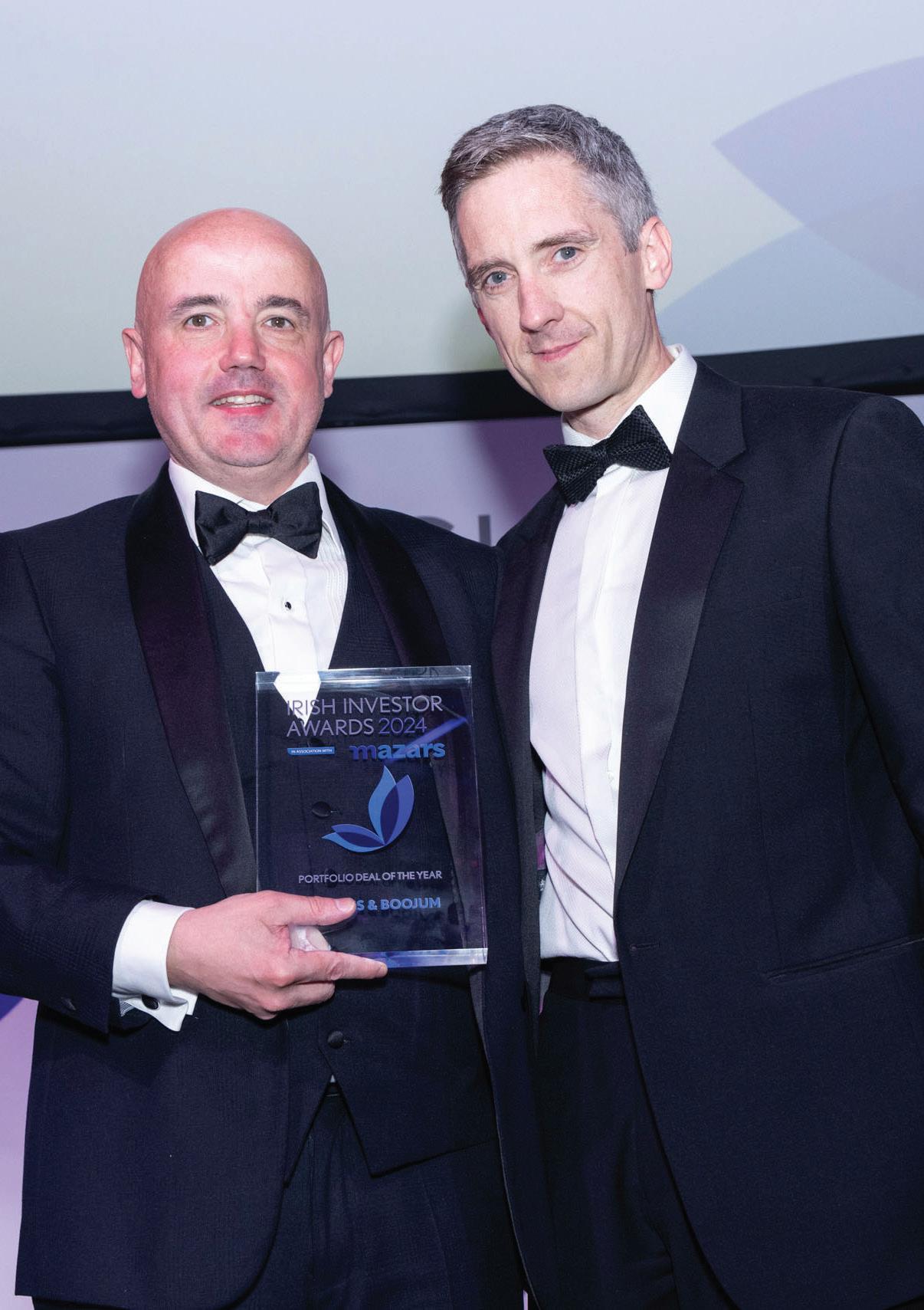
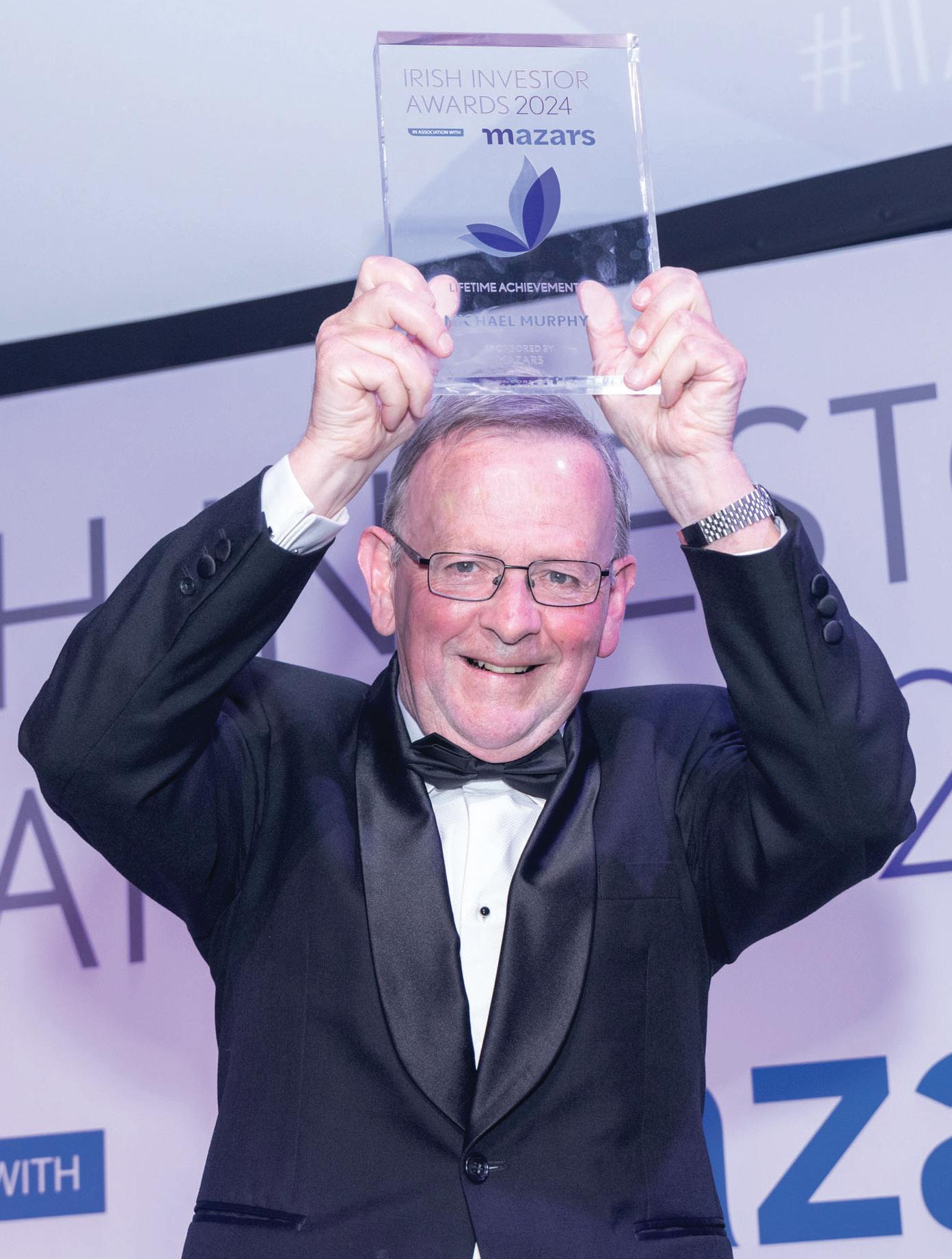


Environmental, Social and Governance Deal of the Year Sponsored by Development Capital BEACH

Many Irish businesses are now repaying Warehoused Tax Debt to Revenue following the 1st May deadline. With this additional outflow, it’s important to review cashflow needs to ensure they maintain enough cash in their business. Running out of money is one of the most common causes of business failure –even a profitable venture will struggle if it runs short.
Businesses should continuously update cashflow forecasts showing all projected expenses and income for the next 12 months to clearly understand when they might face potential cashflow shortages. Otherwise, they risk spending cash now that will be needed to pay suppliers or Revenue in the future. In
addition, unforeseen events (such as loss of a key customer or an unexpected bad debt) can negatively impact cash flows. A cushion will ensure businesses can successfully trade through any disruption. This can be cash reserves, or access to bank lines of credit, overdrafts and short-term loans.
A strong relationship with your bank and understanding the documentation they require can facilitate faster approval of credit facilities, and it is essential to maintain accurate financial records and forecasts to demonstrate your repayment capacity. Presenting a clear business plan with cash flow projections will help ensure a timely approval of the credit you require.
Having difficulty getting a new business loan or restructuring your existing debt with your bank?
Established by the Minister for Finance, Credit Review is here to help.
Talk to the credit experts today on 0818 211 789 or visit creditreview.ie
If your credit application is declined by your bank, Credit Review can help. We provide an appeals mechanism for borrowers who have had their credit applications rejected by an Irish bank (AIB, BOI and PTSB). Our track record is strong: 8 out of 10 businesses we support get a credit solution from their bank. Our appeal process is informal, affordable, and available to all Irish SME and farm businesses. We can review requests for credit facilities such as overdrafts, term loans, invoice or asset finance up to a value of €3 million.
For more information visit creditreview.ie or call the helpline directly on 0818 211789



JENNIFER MCSHANE TALKS TO THREE LEADERS IN THE TECH SPACE ABOUT THEIR DIGITAL TOOLS OF THE TRADE AND MAKING STRIDES IN THE SECTOR
Founder and CEO, Target Integration
started Target Integration in 2008 with a vision to be an honest and independent CRM (Customer Relationship Management) and ERP (Enterprise Resource Planning) company. With 16 years of experience working in various industries including manufacturing, customer services, repair and telecom, he’s worked in all facets of the tech trade. Cloud-based systems might be a must in the tech space now, but back in 2008, they were in their infancy and Rohit quickly identified the gap he wanted to fill.
“The advantages of cloud were and are enormous – that was a big gap in the market back then,” he says. “Of course, Cloud has become the standard at this stage. Nobody talks about anything ‘not cloud’ anymore. Nobody wants on-premise servers at all, which is good.” And this is effectively what Target
Integration, now with offices in multiple countries around the world, does. They help businesses get up in the clouds, as it were. “We help any small business to implement their own cloud-based software and train them on it.”
And naturally, it wasn’t as easy to convince potential customers to get on board with an advancing software as it is now. “It was difficult. Initially, it wasn’t plain sailing. I still remember you would mention the concept of cloud computing or software and people used to say, ‘no, no, no, I want something in my office’ – a physical piece of tech they could see because they felt it was safer, it was more secure.”
With cloud being a must for businesses big and small in 2024, the challenges now are less about convincing customers and more about the people behind it. Specifically, the team needed for continued success.
“Market challenges change and business challenges change,” he agrees. “Because back then, of course, I was the single consultant. Now, at this stage, the challenges are not as much external. The market has accepted cloud, but now the challenges are more
“FOR THE MOMENT WE ARE SMALL AND NIMBLE, BUT WE WOULD LIKE TO BE AT A STAGE WHERE WE ARE GENERATING QUITE A LOT OF BUSINESS AND SALES AND, OF COURSE, SUPPORTING AND GROWING COMMUNITIES AND THE PEOPLE AROUND US SO THEY CAN CONTINUE TO GROW AS WELL.”

internal. Looking at the team, there are 135 people working with us around the globe. So, you’re trying to juggle between 20 here in terms of who is working on what and thinking, where do we hire our next recruit from? We’re looking for graduates to come in and work with us to get the experience, for starters. And we have the challenge of the global market and Microsoft and the biggest software companies here as well; they’re trying to attract talent and that becomes a different challenge from the task you have when you start the business.”
Target Integration has big plans and in the immediate future, quite a goal. “At some stage we want to launch our own IPO,” he continues. “For the moment we are small and nimble, but we would like to be at a stage where we are generating quite a lot of business and sales and, of course, supporting and growing communities and the people around us so they can continue to grow as well.”
CEO, Vertigenius
“Associate professor at Trinity College Dublin and former lecturer at the RSCI University of Medicine and Health Sciences, Vestibular physiotherapist Dr Dara Meldrum is the brain behind Vertigenius, a platform used in Ireland to treat vertigo remotely,” explains the CEO of Vertigenius very succinctly. “And she’s been not just the clinician treating patients, but for the last 10 years or so actively doing research and in particular, looking at how technology can be applied to the condition. She really thought there was a huge problem in the area – 1 in 20 people suffer from the condition that gives the sensation that everything around them is spinning, which can affect a person’s balance. Dara knew there had to be a better way of treating patients. So she came up with Vertigenius a couple of years ago.”
With 25 years in the deep tech space, large corporations overseas from Australia to Austria and Israel, Mark explains he was looking for a new direction and met with Dara when looking at companies to invest in. “I was blown away when I saw how prevalent the issue was in terms of delivering care to people and the long waiting lists. I thought the solution she had come up with was not just a great technical solution, but also really solved a big market problem.”
The most effective way to treat this is called vestibular therapy, he continues. “It’s a form of physiotherapy. But instead of doing exercises with your arms or legs, you’re doing exercises with your head and retraining the balance system. But access is an issue and patients can find the exercises tricky to do on their own. The tech includes a doctor’s portal for easy and treatment prescriptions, a patient app with exercise videos and support tools and a head sensor worn like a hearing aid that tracks head movements in 3D. This setup provides real-time feedback so a patient’s improvement and progress can be easily tracked and monitored.”
Key to the ongoing success of this tech is to have the medical community behind it. “Always with any company, the single biggest challenge they’ll have with new technology is market adoption and this is right up there with some of the best ones that I’ve seen in terms of the interest, the willingness for clinicians to use it, to be involved and give us feedback,” Mark says. “But at the same time, we acknowledge it’s a new technology that changes the way that people are being treated. So what we tried to do is not force a new clinical pathway onto clinicians, but allow them to treat patients in the exact same way with the exact same treatment, but making it much easier for them to apply that treatment. That’s key when it comes to adopting medical technology – to only change things that will bring about positive changes for treatments to enable clinicians to do them effectively and more efficiently.”



“THAT’S KEY WHEN IT COMES TO ADOPTING MEDICAL TECHNOLOGY – TO ONLY CHANGE THINGS THAT WILL BRING ABOUT POSITIVE CHANGES FOR TREATMENTS TO ENABLE CLINICIANS TO DO THEM EFFECTIVELY AND MORE EFFICIENTLY.”


Managing Director, LeanBPI

John O’Shanahan has over 35 years experience in business operations.



explains. “What we specialise in is helping any small company improve their digital adoption. We work with SME and micro-industry clients to provide them with solutions so they can improve their business performance without the stress that can come with the digital realm. But because digital is so complex, it’s not like, just get a mobile phone and pick Vodafone or Three. It’s looking at everything, asking what’s your business? What’s the culture in the company? What are the kind of processes you have? And then it’s matching that and catering to your needs.”
When it comes to keeping up with the fast-paced world of digital and tech, he says from his perspective, there are two big challenges for SMEs – time and a shortage of people. “What we’re seeing is, say you have a small business and they have trouble finding staff. As they grow, they’re held back by their systems and they have to work longer and it becomes more stressful. Technology can help, but crucially, it’s got to be done right.”
This leads us perfectly onto the Limerick-based company’s latest advancement – working with LEOs across the country conducting ‘digital readiness’ assessments. “These provide a clear evaluation
“BY HELPING SMALL BUSINESSES MAKE THE MOST OF THE OPPORTUNITIES PRESENTED BY TECHNOLOGY, WE ARE MODERNISING MICROENTERPRISES ACROSS IRELAND AND HELPING THEM TO FLOURISH, HOPEFULLY STRESS-FREE!”
Having worked with multiple companies in Europe, Asia and North America and spent 17 years overseas, he says he was ready for a change and something on a slightly smaller scale when LeanBPI came along. “I went from, for example, being a plant manager with 500 or 600 staff to being an operations manager and an SME with 30 or 40 staff, so it’s quite a difference.”
“I really enjoyed getting into smaller businesses,” he says, explaining that he also took part in a pilot programme for the LEO (Local Enterprise Office) – LEO is 10 years old this year – which made him want to stay in that environment. Wanting to help businesses create efficiencies within their companies was how LeanBPI was born, the company notably running as long as the LEO.
“We started doing digital systems for SMEs and it grew from there – especially during Covid,” John
of the digital readiness of decision-makers in microenterprises,” John explains. “Our appraisal determines a readiness level ranging from high to low, while also assessing a number of key factors – such as optimism, innovation, discomfort and insecurity – relating to businesses’ approach to digital, change and growth.” This tailored analysis enables appropriate, actionable plans which will guide microenterprises in effectively integrating digital tools and strategies into their operations.
“Microenterprises make up far more of our national workforce and contribute far more to our economy than people are aware of, but many of them are not realising their full potential due to a lack of digital systems, so this is key. By helping small businesses make the most of the opportunities presented by technology, we are modernising microenterprises across Ireland and helping them to flourish, hopefully stress-free!”




e latest UK import controls for agrifoods went live on 30 April. Changes from that date are in addition to the changes which were introduced from 31 January related to advance pre-noti cation of consignments on the UK IPAFFS system and export health certi cation for EU imports. From the beginning of May, there are new border entry Border Control Post (BCP) checks for movements of EU agri-food goods into Great Britain (GB) or via the GB landbridge. ese include full documentary checks and identi cation and inspection controls at UK designated Border Control Posts. A full list of designated UK BCPs can be accessed at defra.gov.uk.
However, these new UK BCP border controls will not apply to imports of Irish goods entering GB via west coast UK ports from 30 April, as UK Government import policy for these ports is not yet nalised. Transit consignments to Ireland from the EU entering via east coast ports will be subject to documentary checks, entry identi cation and inspection controls. e Welsh Government stated recently that its Border Control Posts would not be operational before spring 2025.





IF YOUR BUSINESS USES THE UK LANDBRIDGE TO EXPORT OR IMPORT GOODS TO OR FROM THE REST OF THE EU, YOU SHOULD TAKE STEPS TO ENSURE YOU ARE READY FOR THE NEXT STAGE OF UK IMPORT CONTROLS:
Familiarise yourself with the UK transit guidance and review your business practices to ensure you can comply with the new requirements
Engage with everyone in your supply chain, including your logistics or transport provider, to ensure they are aware of the new requirements and what they must do
Ensure all consignments travelling across the UK landbridge are sealed with commercial seals. Failure to do so may result in a physical inspection of the consignment if it is called to attend a UK BCP for an identification check.
Small Firms Association (SFA) commissioned Amárach to conduct a survey about business costs and asked small businesses about the impact of rising business costs in the past 12 months.
Despite reasonably modest levels of debt, with 46% of businesses surveyed managing debt of less than €10,000, 35% stated that they could not trade beyond six months without additional funding, a 3% rise from a similar survey conducted in 2022. The survey also shows that one third of businesses could not continue or would find it di cult to operate without Government supports.
The research also showed that 83% of small businesses reported increased costs in the past 12 months, with an estimated increase of 16.6% in average business costs. A total of 57% of businesses say that labour costs have contributed to rising costs, while 51% of small businesses say energy costs have risen in the past year. When it comes to insurance costs, 45% of small businesses say they have contributed to overall rising costs, while 37% cited an increase in raw material costs.
Given the scale of these challenges, perhaps it is not surprising to see three quarters would like to see the Government do more to help small businesses get access to the financing they need. Reacting to the publication of the survey, David Broderick, Director of the Small Firms Association said: “The fact that over a third of small businesses will run out of liquidity within six months without any financial aid shows how cashed strapped they are. One in five small businesses have secured funding from friends and family to cope with rising costs. This is an alarming reality.
“With over 80% of small businesses experiencing rising costs, this highlights the clear and present threat to the viability of small businesses which are the lifeblood of communities across the country.”

















The core objective of this research was to assess the impact of the cost of doing business amongst small companies (those with up to 50 employees) in Ireland. The methodology of the survey involved online interactions and telephone interviews. A total of 476 interviews were carried out by Amárach between 26th April and 8th May 2024. 57% of respondents consisted of businesses employing fewer than 10 people and 43% of respondents employ 10 to 50 people.















The trajectory of a more fractured political landscape continued with the outcome of the Local Elections in June













Independent candidates secured almost 20% of council seats with Sinn Fein making gains since the last local election, although significantly below expectations. Fianna Fail and Fine Gael had marginal losses but exceeded the performance in recent polls. The Green Party lost seats which is in line with a general trend against the green movement in Europe, while the Social Democrats made good gains at local level. The Small Firms Association launched its policy priorities document ahead of the election to highlight concerns related to high costs and taxes. With a new batch of councillors in more fragmented councils, the SFA will continue to address the key issues of small businesses to local Government.
















































You may have heard that the Irish Government will introduce a mandatory Auto-Enrolment (AE) pension scheme in January 2025 to boost retirement savings among employees. This initiative aims to address the concerning lack of supplementary pension coverage to maintain a good standard of living in retirement, with only one-third of private sector workers currently having additional pension plans.
From a market/consumer demand perspective, ESRI research indicates that auto-enrolment will be good for the economy in the long-term, as retired people will have more money than they would have otherwise. This will help to sustain consumer demand and business revenues. The benefit for employers is that they’ll be able to look after their employees without the administrative burden and cost of setting up a pension scheme themselves.
In the short term however, it is likely to be a cause for concern for small businesses in terms of costs and logistics. All of the details are not currently available, but the
following information may alleviate some of those concerns and help you begin to plan for the launch.
DO EMPLOYERS NEED TO SET UP PENSION SCHEMES IN ANTICIPATION OF THIS? No. A new State-operated central savings system will be established, coexisting with current occupational pensions. The National Automatic Enrolment Retirement Savings Authority (NAERSA) has been set up to manage the auto-enrolment process and the schemes that employees will be auto-enrolled for. They will inform employers of what they need to do closer to go-live, but their aim is to reduce the administrative burden of enrolling and use existing processes that businesses are familiar with.
WHO IS ELIGIBLE FOR THIS SCHEME?
Employees aged 23-60 earning over €20,000 annually who are currently not participating in a pension plan. Those outside this bracket can opt-in if not already enrolled in a pension scheme.
Employees may have two jobs and earn less than €20,000 per year with each employer but when the two salaries are combined they earn over €20,000, which will make them eligible for autoenrollment and contributions will need to be matched.
People earning less than €20,000 per year and who are aged outside the 23-60 bracket will be able to opt in, as long as they aren’t already in a pension scheme. If employees choose to opt-in they will be treated the same as those who are automatically enrolled and that means the employee, employer and State will contribute the set rates as outlined above.
Any existing pension scheme will run in parallel to auto-enrolment. Any employees
Employer contributions will start at 1.5% of gross pay (to a maximum of 80,000)
In year 4 they will increase to 3%
In year 7 they will increase to 4.5%
In year 10 they will increase to the maximum rate of 6%
Contributions will be fixed and employees or employers won’t be able to contribute less or more than the set rate
Employers and the Government will match employee contributions (€3 from employers and €1 from the Government for every €3 from employees)
Contributions are capped at €80,000 annual salary
This means for the first three years, the maximum amount an employer can contribute is €1,200 a year. This is because 1.5% of €80,000 is €1,200. The maximum amount the Government can contribute is €400 a year, which is 0.5% of €80,000. If you earn over €80,000, you can still contribute but your employer or the Government won't match your contributions on any income over €80,000. Employer contributions will be deductible for corporation tax purposes.
THE PLANNING AND BUDGETING PROCESS FOR THE COMMENCEMENT OF AE SHOULD START NOW
Identify all of the employees who will or could be affected by AE
Make sure you fully understand all the potential cost implications
Consider the potential impacts on your existing pension plan (if relevant)
Consider what approach to meeting AE obligations will suit your organisation best in the initial phase
Ensure that your payroll can take instruction for enrolment
Start formulating your strategy for effective communication to employees of your decisions.
Visit: gov.ie/autoenrolment for all the latest and reliable information
“THIS INITIATIVE AIMS TO ADDRESS THE CONCERNING LACK OF SUPPLEMENTARY PENSION COVERAGE TO MAINTAIN A GOOD STANDARD OF LIVING IN RETIREMENT, WITH ONLY ONE-THIRD OF PRIVATE SECTOR WORKERS CURRENTLY HAVING ADDITIONAL PENSION PLANS.”
that have a record via payroll of either employee contributions and/or employer contributions will not be enrolled in the scheme. There are no plans to force employers to contribute to personal pensions.
If your existing scheme operates waiting periods, then it is likely that some employees will be automatically enrolled into auto-enrolment. However, they will be able to opt-out after six months and join your existing scheme if they choose to. As an employer, you may wish to consider the existing terms and conditions of your pension scheme. In the future, when contributions for the Auto-Enrolment scheme increase, standards of company schemes will be developed with the assistance of the Pensions Authority.
CAN EMPLOYEES OPT OUT?
Employees will be able to leave the system or pause their contributions under certain circumstances, but will be automatically re-enrolled after two years if they are still eligible or they can opt back in before the two years.
If an employee opts-out six months after they have been enrolled, their contributions will be refunded. Contributions made by the employer and the Government stay in the savings pot and will continue to be invested.
WHAT IF A BUSINESS CAN’T SUPPORT THIS?
This will now be law and if a business fails to meet the auto-enrolment obligations as an employer, they will be subject to penalties and possibly prosecution. More information and guides will be available closer to the go-live date.



Theway we work has changed dramatically in recent years. Digital advances and the global pandemic paved the way for a rapid transition to remote and hybrid working. Employees can respond to work calls and emails from a variety of locations, at a time that suits them.
In relation to how workplaces are changing, more employers allow staff to work from home (WFH). According to recent research, most employers view remote/hybrid working positively. Prior to the pandemic, 7% of firms in Ireland had employees who worked from home. This figure is now at 32% and increases again in companies with more than 50+ employees and/or in global companies.
A hybrid working model has obvious benefits for employees, for example, better work/life balance and greater autonomy over how and when their work is done. In addition, there is less (or no) long, tedious daily commutes, freeing
up more personal time at the beginning and end of a weekday, which could be used to invest in exercise, relaxation, hobbies and time spent with family and friends. This ultimately leads to an engaged, motivated and happier employee cohort. Hybrid working involves office/on-site days that allow employees to collaborate on projects/meetings in person with colleagues, socialise with their peers on lunch breaks and provide a productive environment to carry out their duties away from the home office. Some employers provide free meals to entice employees back to the office on nominated on-site days and to make the experience of office working as convenient as possible.
However, employers are also mindful of how remote and hybrid working may potentially increase instances of presenteeism (working when ill), challenges to teamwork collaboration and overwhelming work schedules, mental health challenges, isolation or loneliness which can all lead to burnout. Presenteeism is higher in Irish businesses (27%) compared to businesses in England (21%), a pattern which is consistent across sectors and organisation size bands. The common reasons given for presenteeism by Irish employers is the need to meet deadlines and client demand. Mental health challenges are estimated to cost the Irish economy approximately €11 billion each year, largely due to lost productivity.
The World Health Organisation defines burnout as: “A syndrome conceptualised as resulting from chronic workplace stress that has not been successfully managed”. It is characterised by three dimensions:
1. Feelings of energy depletion or exhaustion
2. Increased mental distance from one’s job, or feelings of negativity or cynicism related to one’s job
3. Reduced professional efficacy.
For the first time, “The Healthy Workplace Ireland: A survey of Mental Health and Wellbeing Promotion in Irish Firms 2023”, authored by Dr Jane Bourke (UCC), Prof Stephen Roper (Warwick Business School) and Niamh Lenihan (MTU & UCC), provides large-scale evidence of health and wellbeing promotion in Irish workplaces, as well as data on absenteeism for physical and mental health reasons, presenteeism and their impact on business performance.
A total of 1,501 Irish employers in the private sector with 10+ employees took part in this survey between September and December 2022. The report is part of a broader international study and compares the prevalence of mental health challenges, absenteeism and presenteeism in Irish and English workplaces, as well as differences in how employers are responding to these challenges. From the 2023 report, we know that employers in Ireland are less likely to support workplace health promotion than in England.
The survey stated that mental health related sick leave has increased post-pandemic, with 64% of employers stating that absenteeism (physical and mental-health related) adversely impacts business performance. Mental healthrelated sick leave is a growing challenge for Irish employers, as more than half report that the proportion of absenteeism due to mental health has increased in the last 12 months. Some of the findings also revealed that 80% of employers in Ireland are not investing in workplace mental health, with 76% of employers seeing employee mental health and wellbeing as their responsibility. This suggests a disparity in employers’ recognition of their responsibilities to and investment in workplace mental health and wellbeing.
32% of Irish employers have an organisational response to mental health and wellbeing and only 20% of employers have a dedicated budget for mental health and wellbeing. Examples of organisational responses to mental health in the companies surveyed include:
Manager
How can organisations build a positive work environment for their employees?
Practical steps an organisation can take to minimise potential for employee burnout include:
Introducing a wellbeing lead at board level
Have a mental health policy, mental health strategy and a robust workplace wellbeing strategy or framework
Encourage employees to not answer emails/ calls outside of working hours and have senior employee lead by example
Ensure effective and up-to date role modelling behaviour/training from managers, taking into consideration the employee/direct manager relationship will influence an employee’s mental health/wellbeing by 69% (which is more than their doctor or therapist and equivalent to the influence of a partner/spouse)
Regular one-to-ones with direct managers, where employees feel comfortable to discuss work and non-work issues that may be affecting their performance at work
Circulate relevant company-wide communications, eg from HR department on work life balance and mental health policies and provide easy on-going access to this guidance (for example, intranet hub)
Complete a psychosocial workplace assessment (for example, Work Positive tool)
Introduce wellbeing and mental health champions
Regularly monitor employee health and wellbeing (for example, surveys or focus groups)
Review what employees may experience in terms of hindrance and challenge stressors in their jobs and how to minimise (or ideally) remove hindrance stressors
Encourage employees who work from home to have a daily routine that signals the end of the working day for them (for example, change of clothes, walk around the neighbourhood, exit the homeworking area).
In June, the nation and its capital commemorated Pride month which honours the diversity, history and influence of LGBTQIA+ individuals. LGBTQIA+ individuals historically had an upbringing characterised by the labelling of their identities as abnormal or pathological, often criminalised because of their existence and subject to social stigma, prejudice and marginalisation. For many individuals, this resulted in their exclusion from their family and community, as well as facing prejudice in crucial aspects of their lives, such as work.
Embracing one’s authentic self is undeniably a groundbreaking action and remaining true to oneself is always the correct course of action. An inclusive workplace promotes employee wellness by positively impacting employees’ ethnicity, gender identity, sexual orientation and expression. This produces a dynamic combination of innovation, inclusivity and collaboration, resulting in a high-performing organisation.
For most individuals, the workplace plays a pivotal role as a significant social environment. We aspire to express our authentic identities and have a sense of belonging in the workplace, allowing us to contribute our whole selves to our professional endeavours. Additionally, we desire our colleagues to have the freedom to engage in similar activities. However, achieving this is sometimes difficult for LGBTQIA+ individuals and other marginalised groups due to persistent prejudice, previous mistreatment and other external barriers to inclusion.





To comprehend the intricate and diverse experiences of LGBTQIA+ groups, it is necessary to have a grasp of the socio-historical backdrop in which they were raised. Human sexuality is a multifaceted subject that has a significant impact on an individual’s physical, emotional, mental and societal wellbeing. Legal advancements have had an impact on the lives of individuals who identify as lesbian, gay, bisexual and transgender in Ireland during the last three decades. Ireland has implemented legislation to safeguard individuals against discrimination in the workplace or public spaces based on their gender identity or sexual orientation. One of the most significant triumphs in the history of LGBTQIA+ rights in Ireland was the national referendum that led to the enactment of the Marriage Equality Act in 2015, granting marriage rights to same-sex couples. Nevertheless, this only impacted individuals within the LGBTQIA+ community who sought to engage in a samesex marriage. In contemporary society, this marginalised demographic encounters a more progressive Ireland, where they are now granted legal rights to marry, inherit property based on their State-approved relationships, adopt children and receive Government benefits. However, they still face obstacles in achieving complete freedom from discrimination in various aspects of life, particularly in employment and within our broader society, where significant stigma persists.
David Casey is DeCare’s Head of Health Promotion and a Doctorate Candidate of Trinity College Dublin. Find out more about our dental, vision and wellness programs at decare.ie




Ask yourself –have you or a work colleague ever?
Concealed the identity of your partner from unfamiliar individuals and were apprehensive about expressing your true self in a professional setting? Are you worried about expressing your true self among your family and others? Have you experienced concerns about expressing your true self when in public? Have you ever encountered derogatory remarks while minding your own a airs in public or felt hesitant to hold your partner’s hand openly? Have you personally encountered instances of physical abuse when behaving in a typical manner due to your identification as a member of the LGBTQI+ community, or have you observed such instances of abuse?
If you, a friend, or a work colleague are experiencing this, it is important to recognise that the fight for equal rights is still ongoing. A small enterprise has the potential to foster a nurturing atmosphere for all individuals. Throughout the year, we consistently commemorate diversity and inclusion. It is important for employees to have the opportunity to communicate their narratives, encounters and concepts in the workplace in order to enhance the overall work environment for all individuals. Allyship holds significant importance in both the internal and external realms of the workplace. It signifies that inclusiveness extends beyond LGBTQIA+ employees to encompass the entire workforce. Comprehending pronouns and the ever-changing LGBTQIA+ terminology, together with the various flags, may be quite daunting. Consequently, individuals may hesitate to seek clarification due to concerns about causing o ence. Workplace-wide trainings and workshops are o ered in collaboration with organisations like LGBT+ Ireland and prideatwork.ie and the Irish Centre for Diversity collaborate. Although wellness programmes and e orts can o er assistance and support, they often overlook the specific stressors faced by LGBTQIA+ employees. These stressors might be considered as minority stress, which is a specific type of social stress experienced by individuals belonging to stigmatised groups due to their minority status. Assist in establishing secure and nurturing surroundings every day of the year and prioritise this for your small businesses today. Utilise inclusive language as a primary approach and provide training to both individuals and teams. A workplace should be a place where we can thrive, not just survive.























TRADITIONAL BOOKSHOPS ARE DOING EVERYTHING THEY CAN TO FEND OFF TOUGH COMPETITION FROM ONLINE RETAILERS AND THE GROWING POPULARITY OF AUDIOBOOKS

O’Reilly
We’re a country revered for our rich literary heritage, from the scribes of the Book of Kells to the greats like Joyce, Yeats, Beckett and far too many world-renowned contemporary authors of the 20th and 21st century to even begin to list here.
From commercial fiction successes to prestigious literary prize winners, we punch above our weight when it comes to the written word.
Yet few of us spare a thought for the behind-thescenes workings of the industry as we plough our way through our beach reads, picked up in the airport bookshop – and even less thought goes to the effect on the book industry of downloading that same book on an e-reader device.
However, for those involved in the book world –writers, agents, publishers, booksellers – the challenges of staying relevant and profitable in an increasingly digital world are never far from their minds.
Sheila O’Reilly returned home to Ireland to retire after spending years in London where she ran three bookshops. However, if anything she is now busier than ever, working as a project manager for the Booksellers Association learning platform, mentoring independent bookshops, judging literary prizes and launching a successful and well-received literary festival, Dingle Lit, in her adopted home in the Dingle Peninsula, Co Kerry (the festival is unique in that, set in the heart of the West Kerry Gaeltacht, it celebrates both Irish language and English language writing).
After decades in the business, O’Reilly has seen major changes unfold and is cognisant that selling books is a tough business. For even the shyest and most

retiring of authors, public engagement through book launches and signings, literature festivals and social media are crucial to shift a few extra paperbacks.
And booksellers have to work extra hard too, with multiple demands on people’s attention, from podcasts and audiobooks and online retailers, particularly Amazon, pulling the rug out from under traditional bookshops. “I always see booksellers who run their own businesses as entrepreneurs; they have to be hugely driven,” O’Reilly says.
A quick overview of our indigenous book industry – publishing houses in Ireland include large and well-established firms such as Gill Books, one of Ireland’s oldest (which today has a strong focus on celebrity authors, ranging from Blindboy Boatclub to Francis Brennan), to independent presses such as Tramp Press, which like many smaller endeavours is reliant on Arts Council grant funding to top up its coffers so it can nurture literary talents like Doireann Ní Ghriofa and Sara Baume.
Distributors and wholesalers – such as Gill’s distribution arm and Argosy – manage the warehousing and logistics side of things for publishers. What happens next is interesting for authors (and would-be authors, scribbling away in their garden sheds). It doesn’t take many sales to hit the bestseller list in Ireland; O’Reilly reckons 600 book sales on an average week could do the job. “You certainly won’t be buying a summer house in France on the proceeds,” she laughs.
However, not all sales count towards the bestseller list, only those bought from retailers who participate in the Nielsen BookScan tracking: she cites the town of Dingle as an example. There are four retail outlets where one can purchase a book in the town – Dingle Bookshop, An Café Liteartha, Garvey’s SuperValu and Leac a’Ré gift shop – but only books bought through the Dingle Bookshop are counted in the ratings which determine the so-called bestsellers.
Two of the best-known operators in the market are Irish bookshop chains Eason and Dubray, although few consumers might recall that Eason acquired the former indie chain Dubray’s 11 shops in 2020 – but in a tough market, facing down increasing competition, there may be strength in numbers, adding to the 54 shops already trading under the Eason brand.
In a letter sent to shareholders in September 2023, Eason chairman David Dilger said the Government’s free primary schoolbooks scheme had a “very negative impact” on the firm’s business to the tune of a €2.5 million hit to its revenue.
Now, along with every other bookseller in the country, they face added competition from Amazon’s promise to launch a new dedicated website for Ireland in 2025. Commenting on the pressure this will place on indie retailers, Sarah Kenny, of the iconic familyowned Kenny’s bookshop in Galway, told The Irish
“BOOKSELLERS ARE GOING TO HAVE TO MAKE THEMSELVES ESSENTIAL PARTS OF THEIR COMMUNITIES AND THAT’S REALLY HARD.”
Times in May that, “There is a great fear that this will have a massive impact on small and medium businesses across the country on the high street,” noting that when Amazon came to the US, there were approximately 5,500 independent book shops across the United States and now there are less than 2,000. It’s hard to compete with convenience. “Someone’s sitting at home reading a review and they can either go into town over the following days, or they can order it online and have it the next day. That’s going to be really challenging,” says O’Reilly. “Booksellers are going to have to make themselves essential parts of their communities and that’s really hard.”
Her own strategy, when she was running her shops, was to run events to bring in a crowd, creating a memorable and personal experience by giving people a chance to get up close and personal with their favourite authors.
“You would get people coming in for events because they love hearing the authors read and knowing more about the books; it feels like a little bit of insider information.” Also, she points out, people do like to buy copies of a book signed by the author. However, it isn’t necessarily a money-making endeavour, more of a branding exercise. “People would think of us when they go to buy a book and start coming in regularly.”
Another opportunity O’Reilly sees for indie booksellers to carve out more sales is by taking a leaf out of Amazon’s book and taking pre-orders. “Most of the big titles for this year have been announced now – for example Johhny Sexton’s forthcoming autobiography is going to be huge and if bookshops took advance orders for that, they could guarantee lots of sales.”
According to the American Booksellers Association, pre-orders account for up to 30% of overall sales, which indicates that many sales are occurring before the book even arrives to stores. Authors frequently shout out to their followers on social media asking them to pre-order their books, hoping for a first week hit in the bestseller lists. Bookshops are missing out.
So if you’ve been dreaming of packing in your job and writing a bestseller, can you actually make a living from it? If you hit the lofty heights of the Irish bestseller lists, you might be able to afford a bottle of Champagne to celebrate, but you’ll definitely be keeping on the nine to five, says O’Reilly. However, if you sell the rights abroad to larger foreign markets or get it optioned for a movie, maybe then you can start looking at those property listings in Provence…
Dingle Literary Festival takes place from 15-17 November. For more information, see dinglelit.ie
SUMMER IS A GREAT TIME TO REWARD EMPLOYEES FOR A HOLIDAY
When we think of rewards, many companies think of Christmas, but the truth is that rewards are for all year round; employees need them. The impact is clear: a BHN survey found that 49% of leaders said they observed increased team motivation and productivity because of staff rewards.
Adrian Krajnik, Corporate Account Manager, One4all Rewards says: “In recent years, we have seen a significant increase in orders during the summer months. Employers are now beginning to recognise that although rewards at Christmas are so important, they are also required during the year. Staff go on holiday, take their annual leave, and
spend more time with their families; it’s the perfect time to reward them.”
The good news is, as a business, you can reward your staff with up to €1,000 tax-free, thanks to the increase in the benefit in kind limit. You can give employees up to two small benefits under the condition that they do not exceed the threshold. This change allows businesses to reward their employees with up to €1,000 per annum in One4all Gift Cards, exempt from tax, PRSI, and USC charges, potentially saving up to €1,313.54 per employee.
Investing in your employees not only acknowledges their dedication but also fosters a sense of belonging within your

organisation. It enhances employee loyalty, which, in turn, can have a positive impact on retention rates. Ultimately, you are saving money and effort on recruitment and training.
Our One4all Gift Cards can be loaded with anything from €15 to €150, with our Digital Gift Card offering employers the chance to personalise the gift with their company logo or a video message. For values above €150, our One4all Chip & PIN Gift Card is available in a physical or digital reloadable format.
For more information, email rewards@ one4all.ie or visit one4allrewards.ie to place your order today.




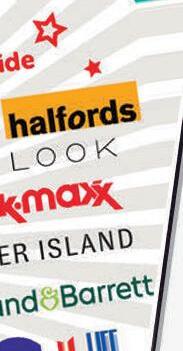





















EXPORTING THEIR PRODUCTS OR SERVICES ACROSS THE WATER NEED TO BE MINDFUL OF NEW REQUIREMENTS COMING INTO
This year, the UK is introducing new customs and sanitary and phytosanitary (SPS) requirements on all goods imported into Britain from the EU including Ireland, as part of its Border Target Operating Model (BTOM). These new rules impact all Irish traders exporting goods to Great Britain or via the UK landbridge to the rest of Europe and are in addition to the existing formalities that apply when exporting goods from the EU.
Asour nearest neighbour, the trading relationship between the UK and Ireland has always been close, offering a large marketplace on our doorstep for Irish companies making their first forays into exporting goods and services abroad. According to figures released in May by the UK Department for Business & Trade, total UK imports from Ireland amounted to stg£32 billion in 2023, an increase of 11.3% on 2022 figures.

Previously, if you were importing non-controlled goods from Ireland to Great Britain you could delay making your customs declarations for up to 175 days, as long as you made an entry in declarant’s records at the time of import. The Border Target Operating Model (BTOM), which is the UK government’s plan for a new approach to importing goods into Great Britain, outlined a timeframe for the removal of this easement. Goods moved from the island of Ireland became subject to checks and controls on a phased basis from 31 January 2024.
5.1%

Total trade (exports plus imports) between the UK and Ireland amounted to stg89.3 billion in 2023, an increase of 7% on 2022



Most recent figures show that UK exports of goods to Ireland decreased by
in the 12 months to March 2024, compared to the same period the previous year 11.4%
Ireland has received EU assistance to help mitigate the financial consequences of Brexit through the Brexit Adjustment Reserve. This €5.37 billion funding source provides support to the EU Member States, regions and sectors worst affected by Brexit. Ireland was allocated in the region of €1 billion, which is 20% of the entire reserve and the biggest share of the fund. It received €361.5 million in 2021, €276.7 million in 2022 and €282.2 million in 2023.
In 2021, the inward stock of FDI coming from UK to Ireland amounted to stg£70.2 billion
The UK’S BTOM provides for the introduction of documentary and risk-based identity and physical checks on medium risk animal products, plants, plant products and high-risk food and feed of non-animal origin from the EU, including Ireland, from the 31 October this year. However, the date for the start of physical checks in ports on the west coast of Great Britain has yet to be confirmed. Additionally, the requirement for Safety and Security declarations for imports into Great Britain from the EU, including Ireland, will come into force from 31 October 2024.
The Common Travel Area between Ireland and the UK continues to be recognised, along with the rights it grants to Irish and British citizens. This includes the right for Irish and UK citizens to live, travel, work and study within the Common Travel Area.



If your business is exporting goods to Great Britain, you must submit an electronic export declaration to Irish Customs using a customs software package. Alternatively, a customs broker, acting on your behalf, can submit the declaration. There is also a legal requirement for an electronic customs Safety and Security (S&S) declaration in advance of export. This is usually completed as part of the export declaration. If not, the carrier is responsible for ensuring that the Exit Summary Declaration (EXS) is submitted to Irish Customs.


While travellers need not worry about getting hit with expensive phone bills after a trip to the EU anymore (calls, texts and data usage are charged at domestic rates), mobile phone roaming charges for Irish customers travelling to the UK are no longer guaranteed by EU regulations. According to Comreg, your mobile provider should inform you when you have spent €61.50 (including VAT) and then again when you have used €123.00 (including VAT) in a monthly billing period, giving you the choice to opt out or continue using roaming services.
Goods accounted for 61.2% and services for 38.8% of all Irish exports to the UK in 2023


Alpha Wealth, we have just celebrated a significant milestone – our 10th anniversary – and now boast a staff of 12. If you were to ask me what characteristic has enabled us not just to survive but to flourish in a competitive and saturated market, I would say it’s our ability to adapt.
Starting a business whilst Ireland was still coming out of recession and competing with established players was daunting, but the real test came with the regulatory changes imposed on the industry. The impact of Covid-19 further pushed us to adapt. We had to transition to a virtual way of doing business, managing both internal operations and client interactions remotely. Embracing online platforms like Teams and Zoom and incorporating tools such as DocuSign was challenging, but essential. Darwin’s concept of Survival of the Fittest rang true as we adapted quickly, launching complimentary educational webinars that transformed our business and expanded our reach nationally.
I moved to Cork in 1999 from London, never intending to become a business owner. My background in investment banking didn’t quite align with the Irish job market, so I reinvented myself as a financial advisor, working primarily in banks for the next 15 years. While I thought coping with the financial crash of 2008-2009 would be my biggest challenge, an opportunity to leave the corporate world in 2014 felt natural, despite the uncertainties.
Competing with bigger firms with more resources has always been tough. However, being smaller allows us to be more nimble. Our unique selling proposition (USP) is a comprehensive service offering that includes areas we don’t directly provide. For example, we offer independent reviews of health insurance plans and competitive deposit rates through German banks and assistance for individuals claiming the UK state pension.
At Alpha Wealth, we believe that “the measure of success is the ability to change.” Our journey is a testament to this, demonstrating the power of adaptability and resilience in the face of challenges.
Nick Charalambous is the Managing Director and Owner of Alpha Wealth, a financial services company with offices in Cork and Dublin
5AM I’m an early riser as I like to enjoy my morning co ee in peace and relax before the day kicks o . I cycle into town most mornings, it only takes 20 minutes and I usually pop into the gym before clocking into work. 7.30AM I’m the Head Chef at The Farmgate Café in The English Market in Cork. We serve breakfast and lunch so once I arrive, it’s straight downstairs to the various stallholders to choose my meat and fish for the day. I’ll have lots of conversations with the stallholders to see what’s due in so I can plan the menu for the days ahead. We see ourselves as a bit of a cooperative in the English Market, it’s a very supportive environment. Mornings are also spent preparing dishes for our own stall downstairs where we sell meals to go. 12.15PM Once breakfast is over, we’re ready for our lunch service. The restaurant is divided into two sections – the dining room for a more leisurely lunch and the gallery, which is great for a quick lunch. It’s the same menu, just a di erent style of service. I’m also busy preparing for my pop-up ‘Harvest Feast’ during the Cork on a Fork festival in August. It’s going to take place at Glenbrook Farm in White’s Cross and all ingredients will be sourced directly from the farm. 3.30PM Service wraps up so all that’s left is to clean down and finalise orders for the next day. 5.30PM When our schedules align, mself and my two children will try and sit down together for dinner. I’m also the cook at home! My son Evan works with me in the kitchen at The Farmgate. He’s with me since leaving school and he’s excellent. My 14-year-old daughter, Seren, is also a great cook and can create the most amazing dishes with the air fryer. 7PM To relax, I like to read. I start a lot of books but rarely finish them! I like to meet friends and maybe go for a walk and I still watch DVDs; I love putting something on with no ads. I’m a master in Sudoku on my phone, it’s great for taking your mind o everything and winding down. 9PM A super early start means I’m in bed and asleep early, so I can do it all again the next day!
WWW.FARMGATECORK.IE
PAMELA KELLY, HEAD CHEF AT THE FARMGATE CAFÉ IN CORK, IS GEARING UP FOR HER HARVEST FEAST LATER THIS SUMMER
“WE SEE OURSELVES AS A BIT OF A COOPERATIVE IN THE ENGLISH MARKET, IT’S A VERY SUPPORTIVE ENVIRONMENT.”



Attract

















Electric Ireland, with our official partner NRG Panel, are proud to offer innovative Solar Photovoltaic (PV) panels and expert installation.

Save up to 50% on your business electricity costs*

Opportunity to sell electricity back to the grid under the Microgeneration Scheme

Reduce your carbon footprint
I gcomhar lenár gcomhpháirtí, NRG Panel, is cúis bhróid do Electric Ireland Grianphainéil Fhótavoltacha (PV) nuálacha arna suiteáil ag saineolaithe a chur ar fáil.

Sábháil suas le 50% ar leictreachas do ghnó*





Deis le leictreachas a dhíol ar ais leis an eangach faoin

Scéim Micreaghiniúna

Scan here or visit electricireland.ie/solar-for-business

Scan anseo nó téigh chuig electricireland.ie/solar-for-business













*This varies from business to business depending on the load and size of the premises. Our Solar PV product is currently only available to Republic of Ireland customers.
*Athraíonn an figiúr seo ó ghnó go gnó toisc go mbraitheann sé ar an lód agus ar mhéid an áitribh. Níl ár dtáirge grianphainéal fótavoltach ar fáil faoi láthair ach do chustaiméirí i bPoblacht na hÉireann.







Laghdaigh do lorg carbóin















In Conjunction With
































































































































